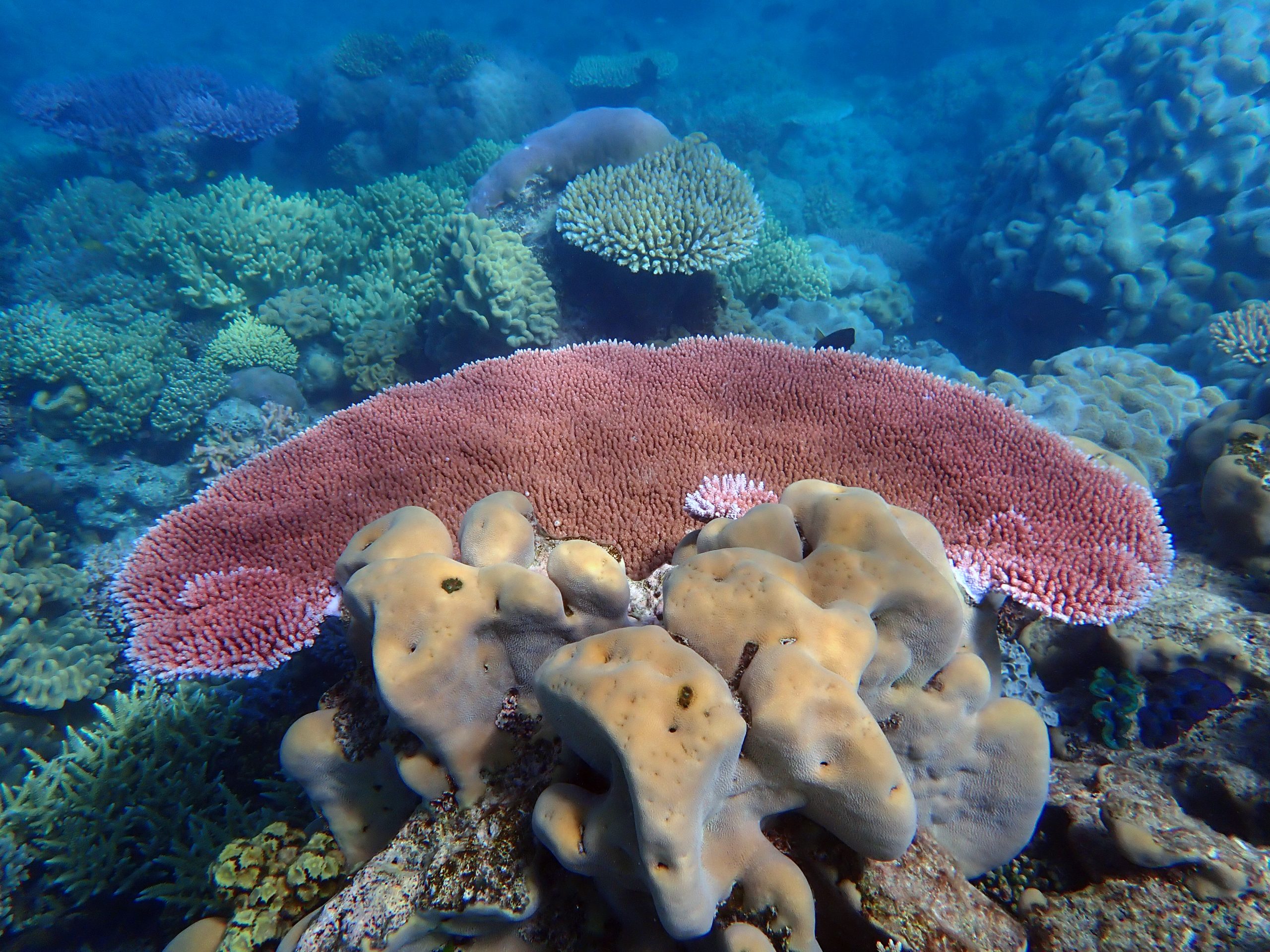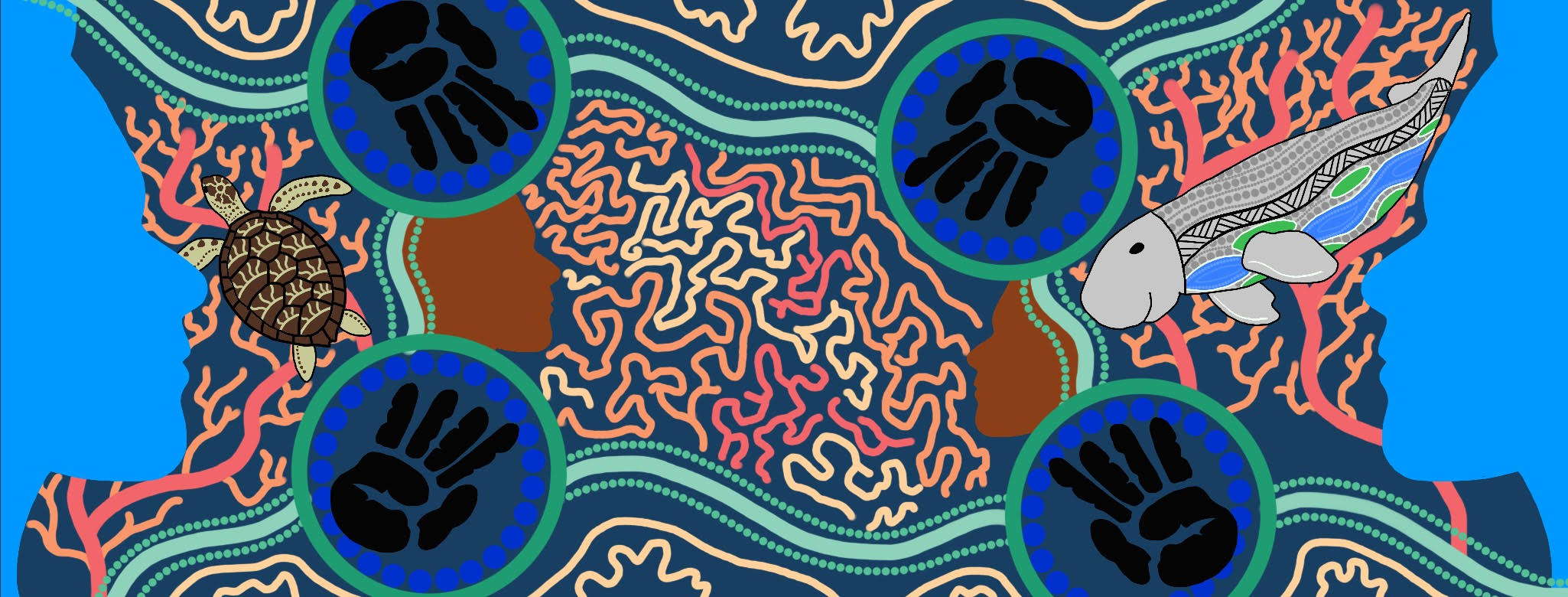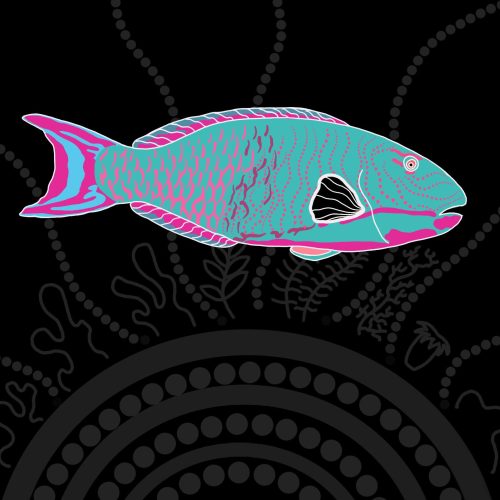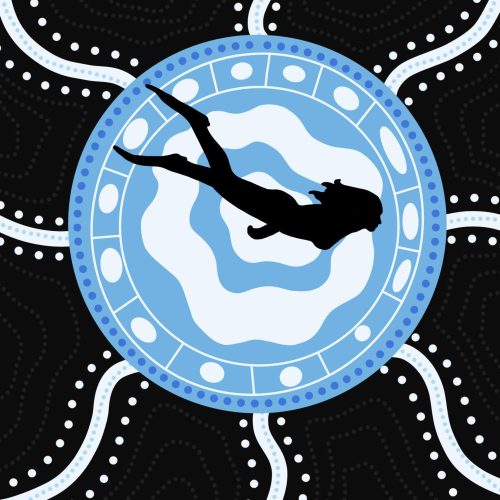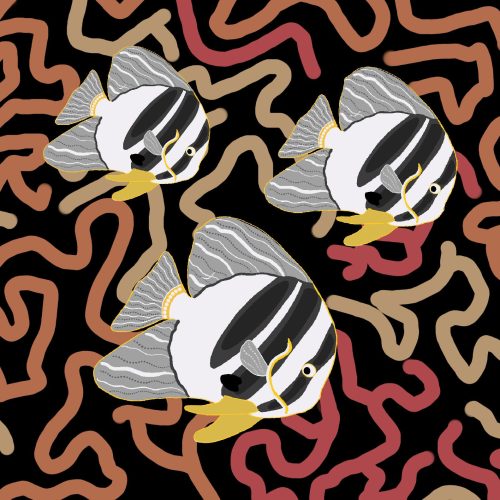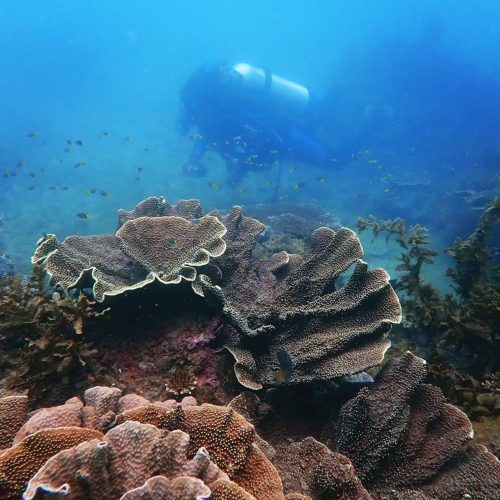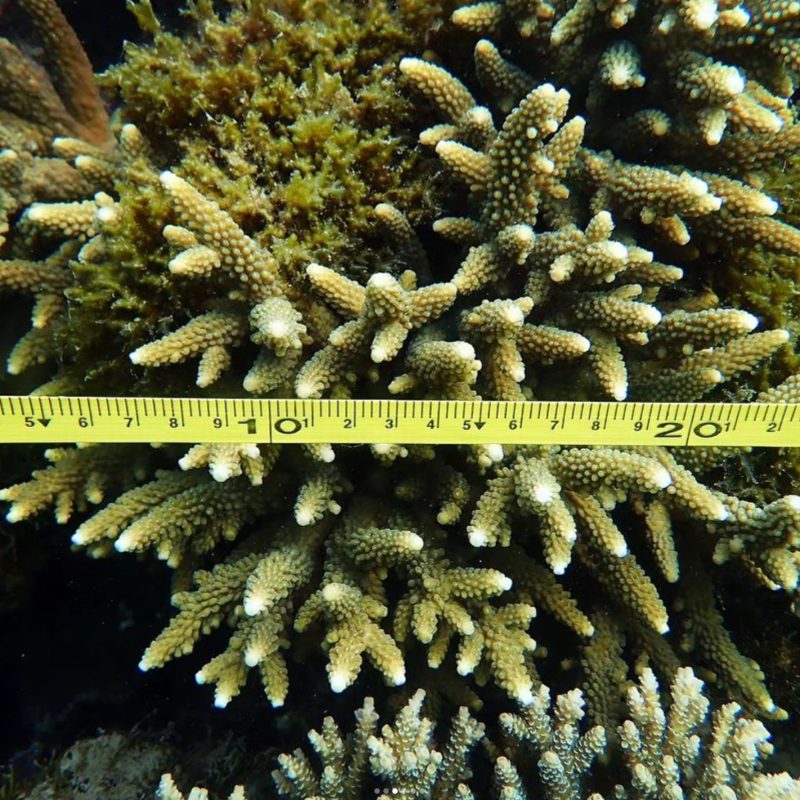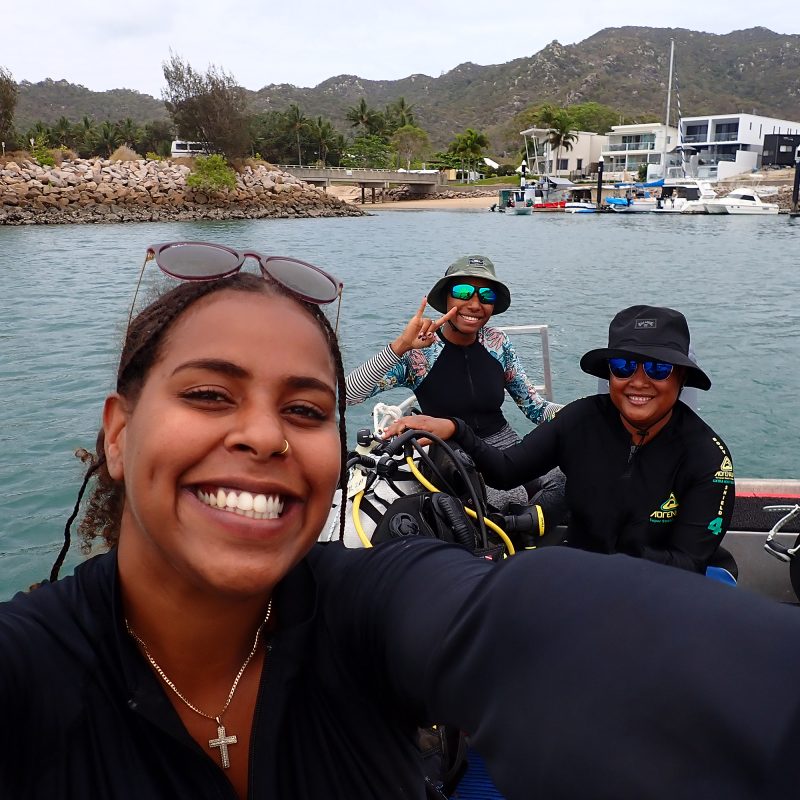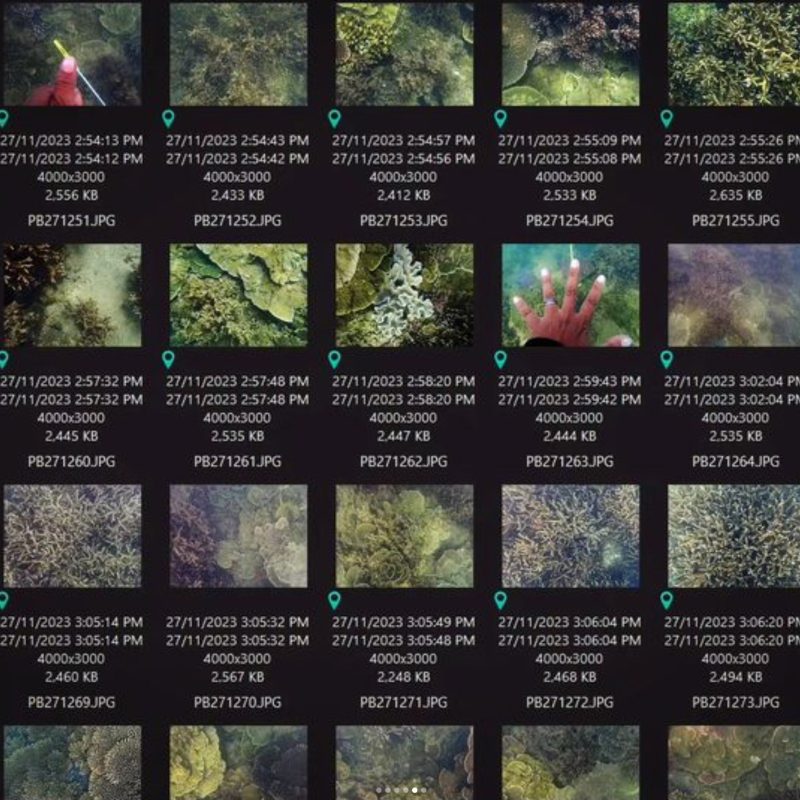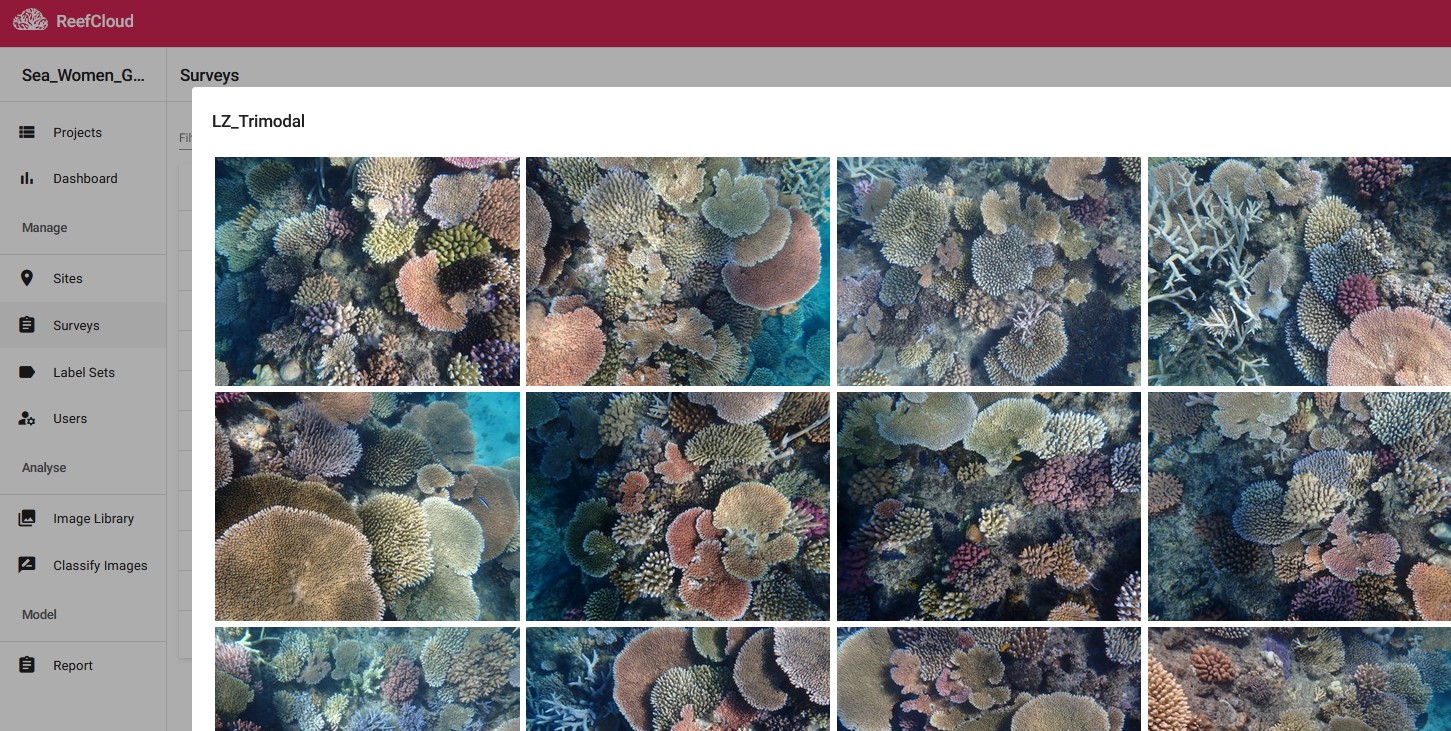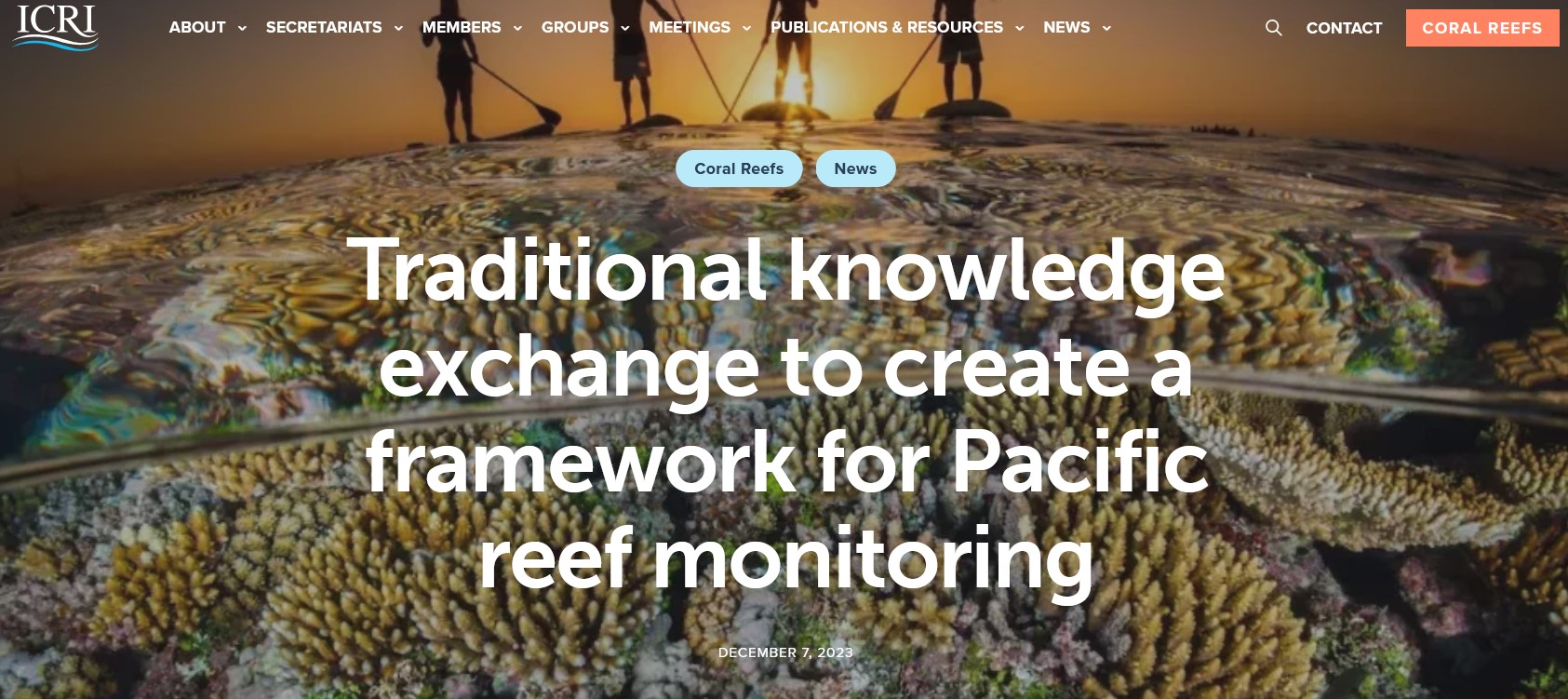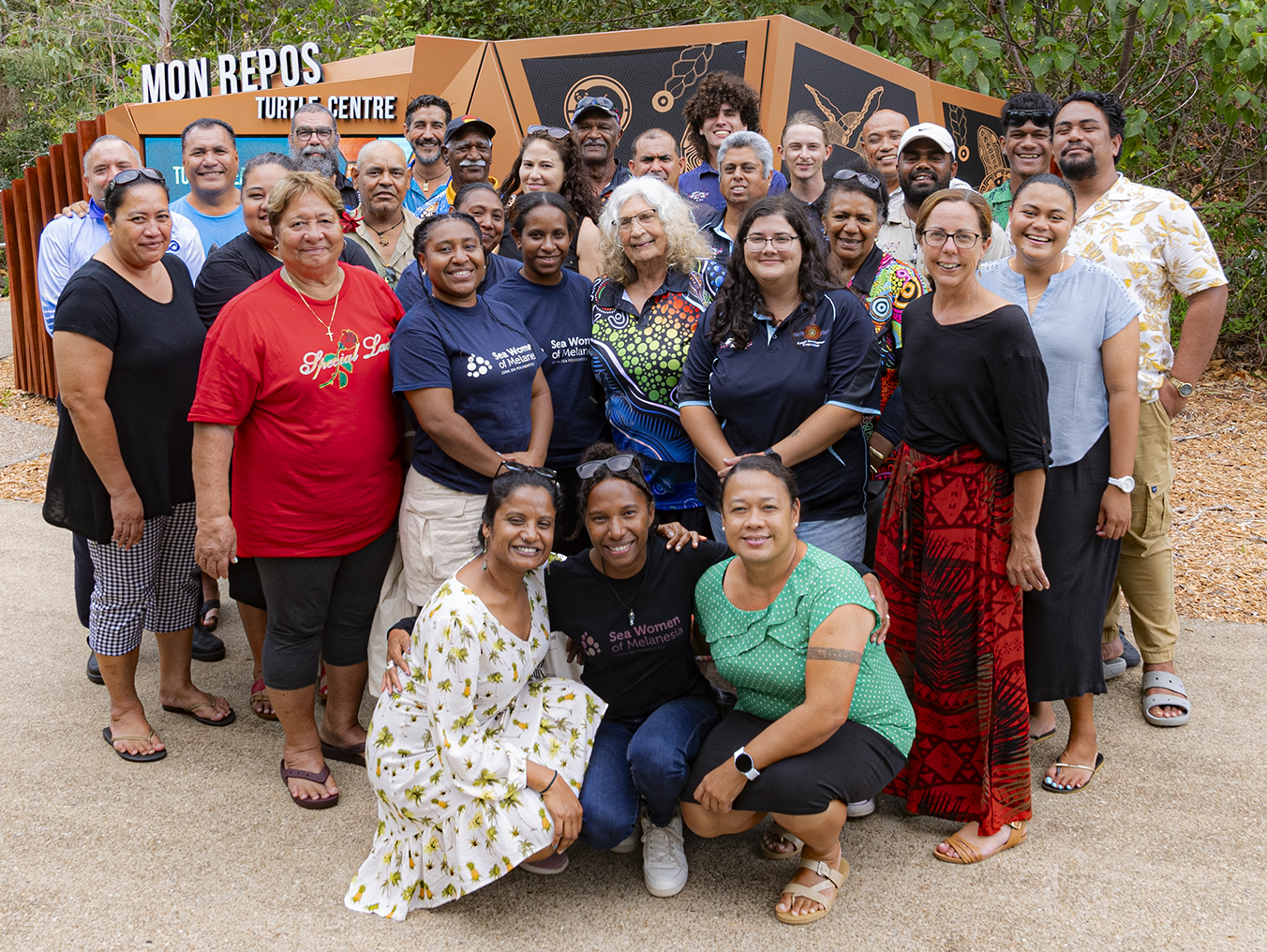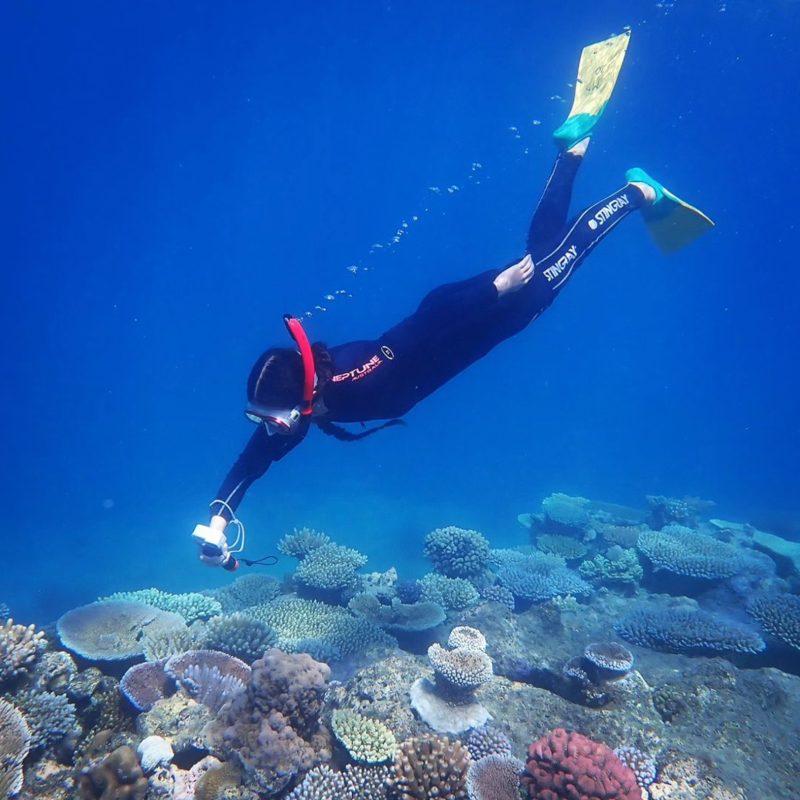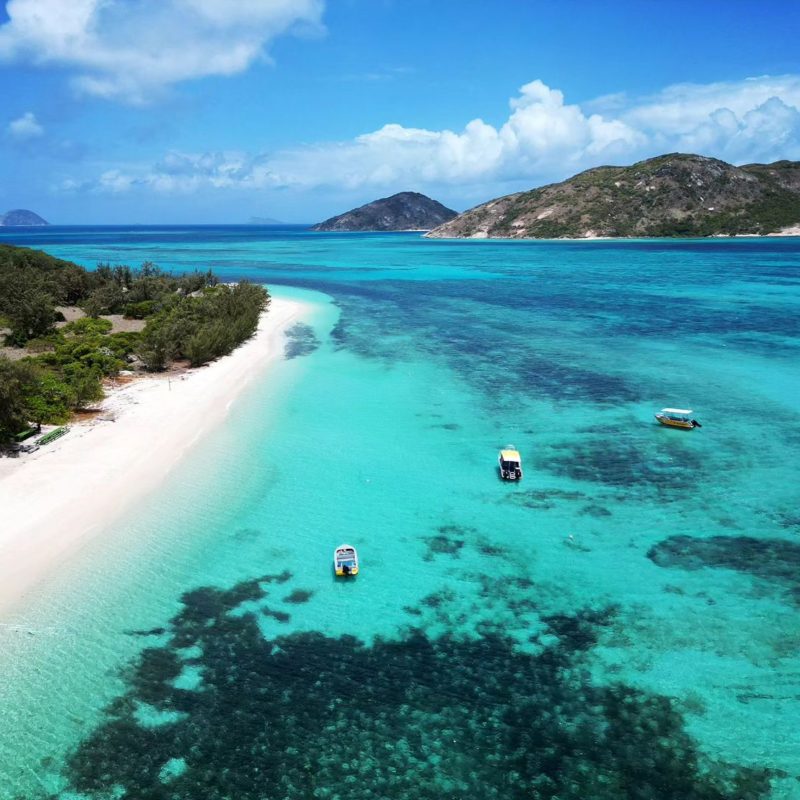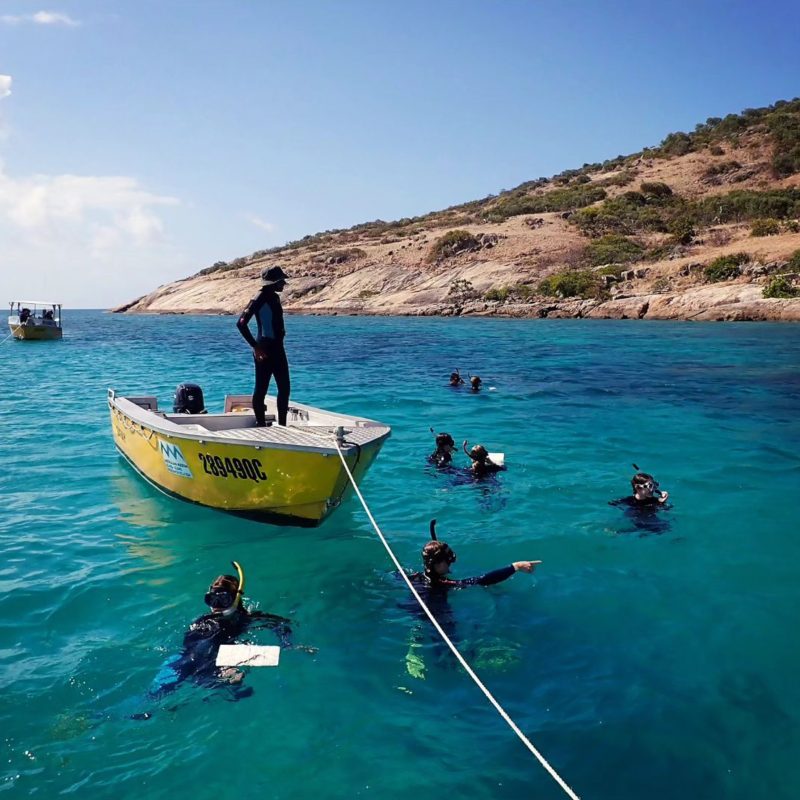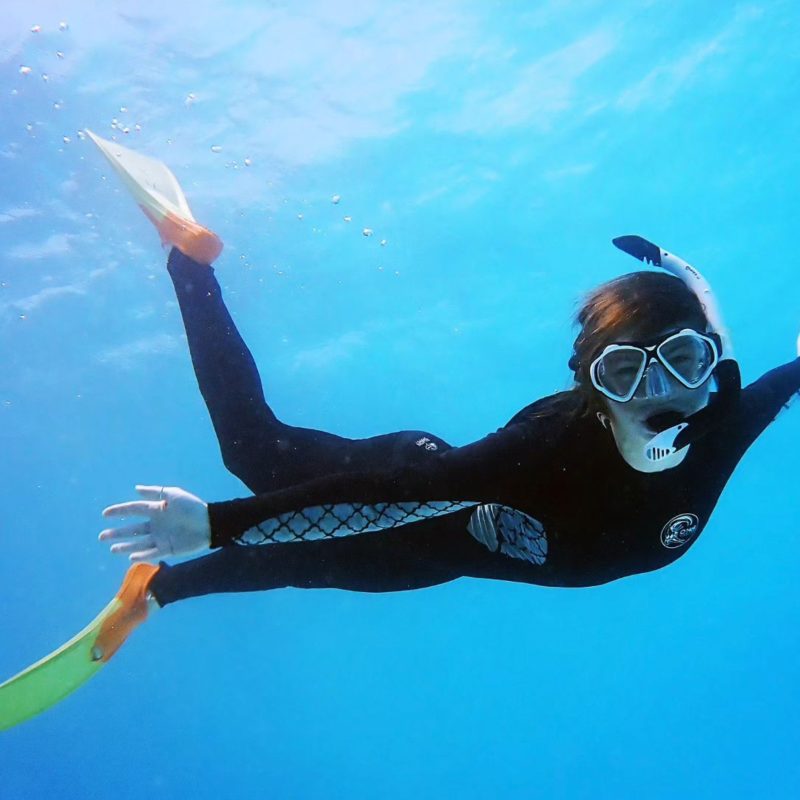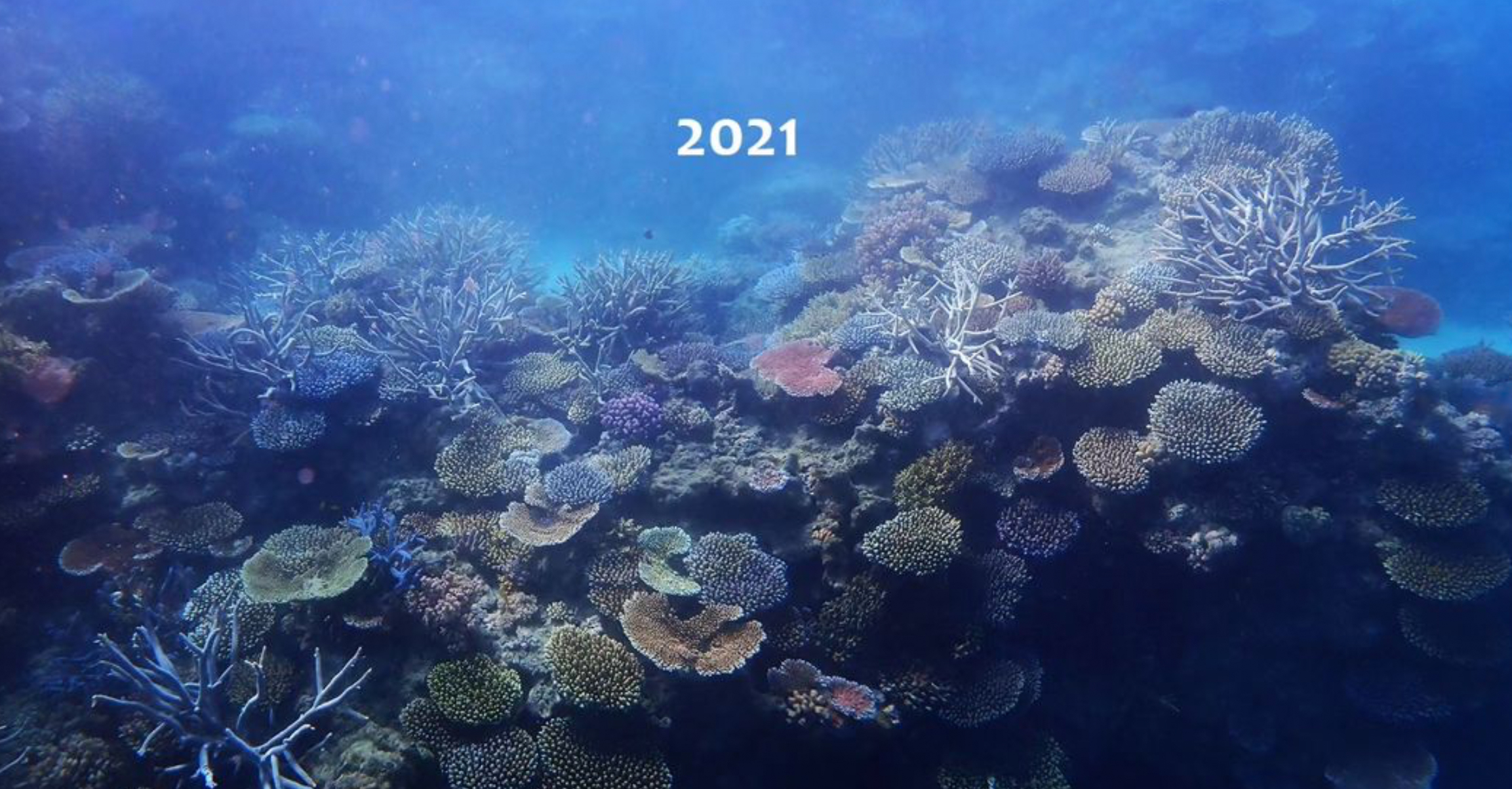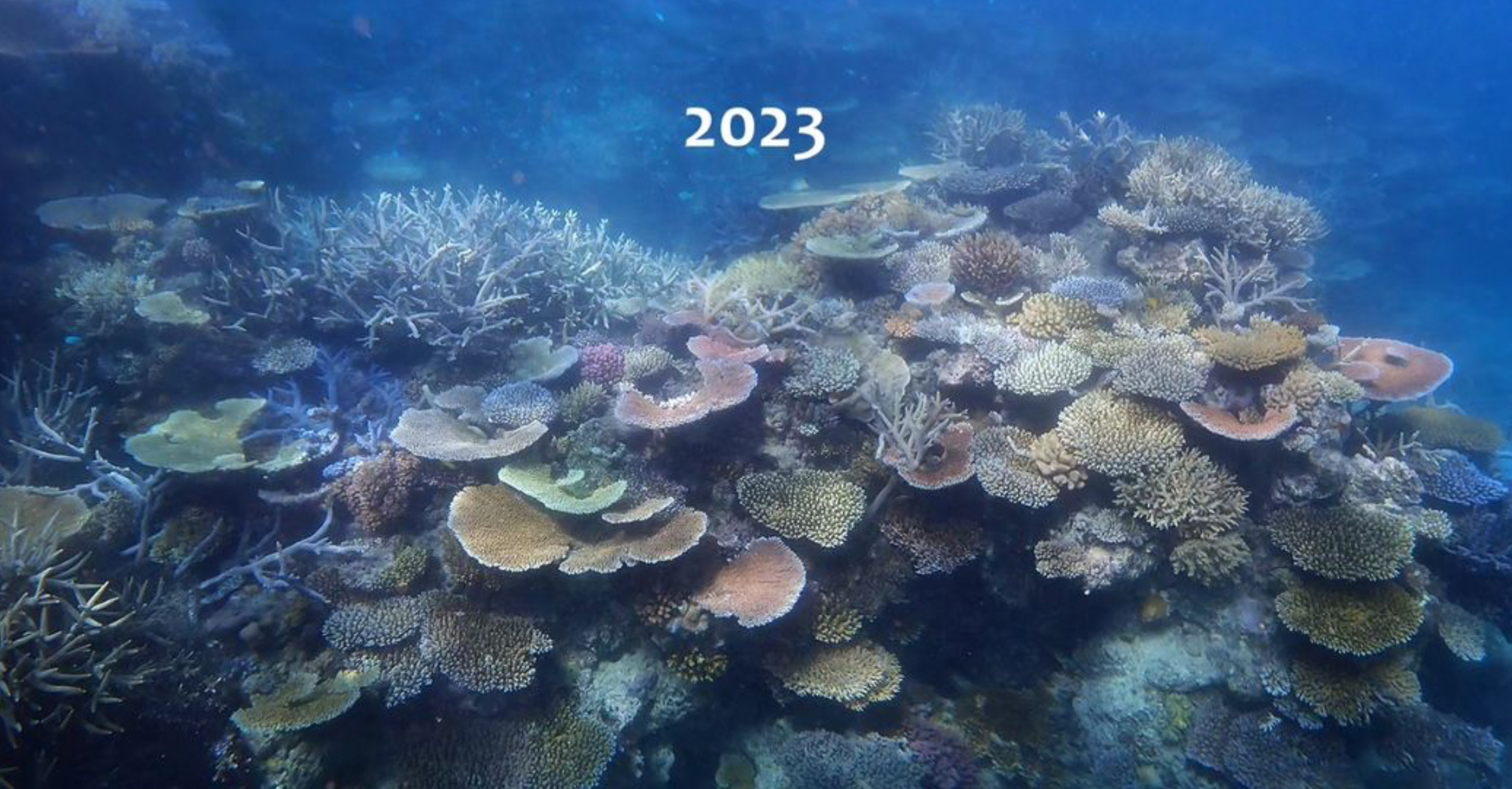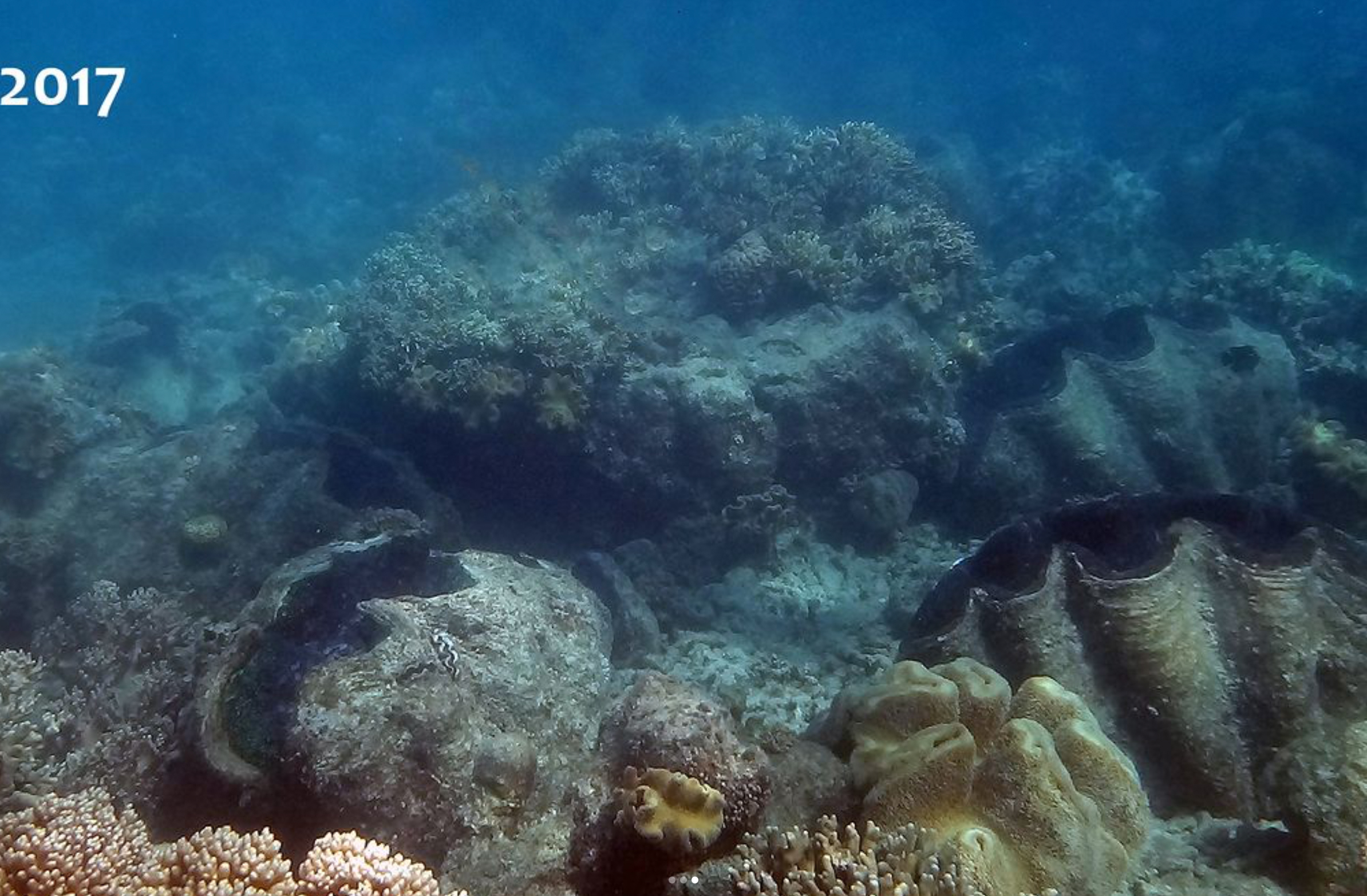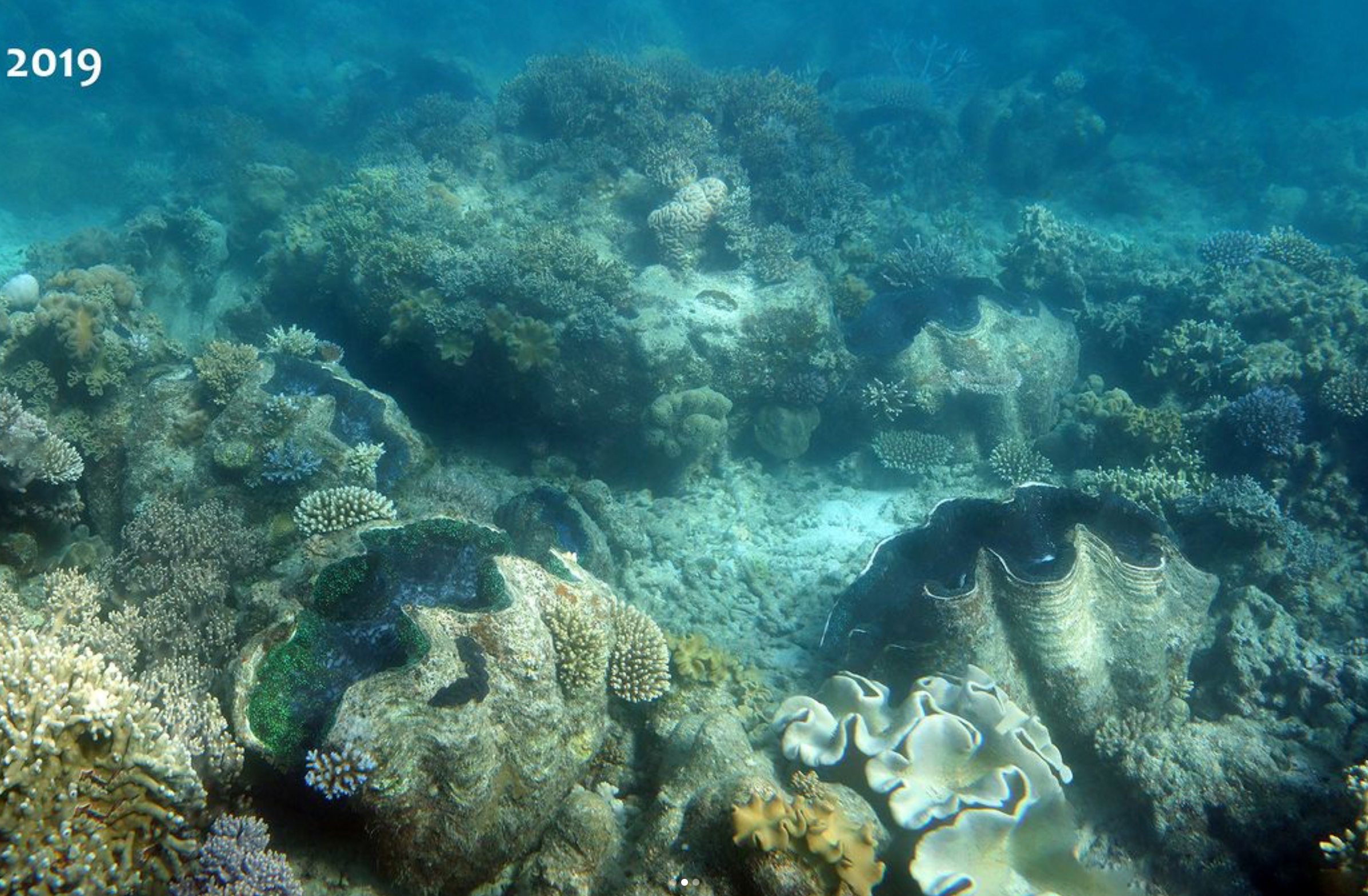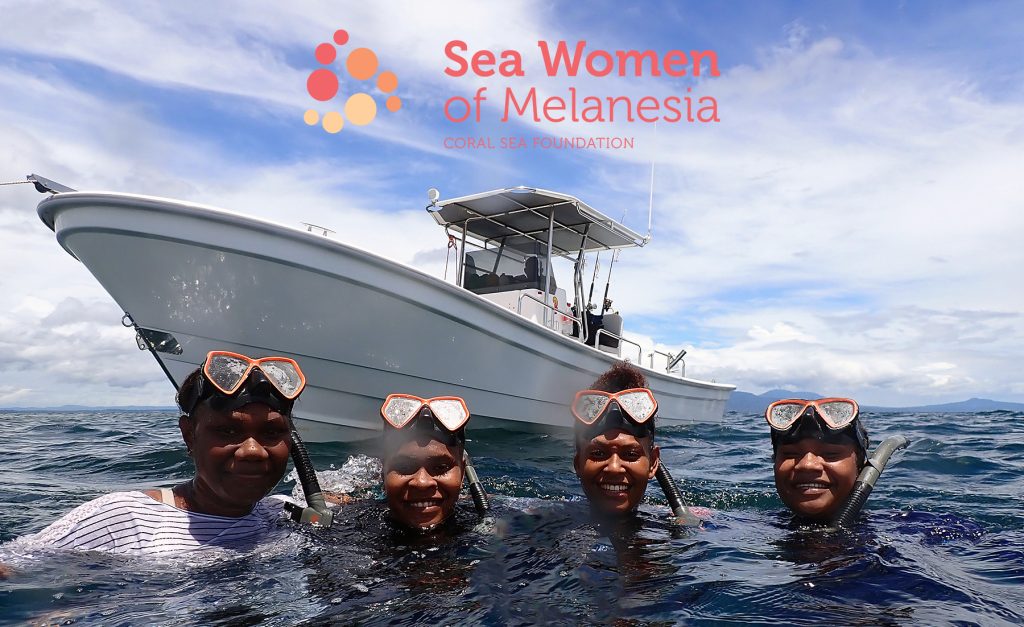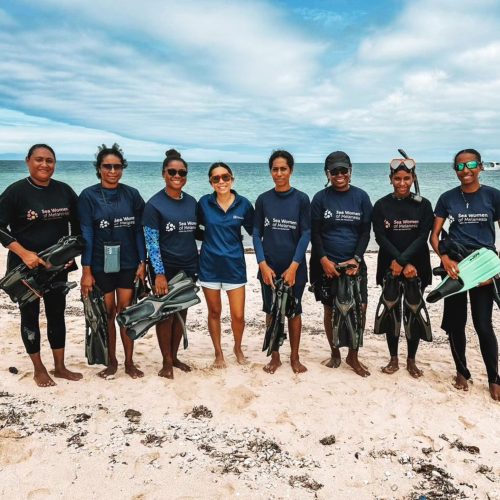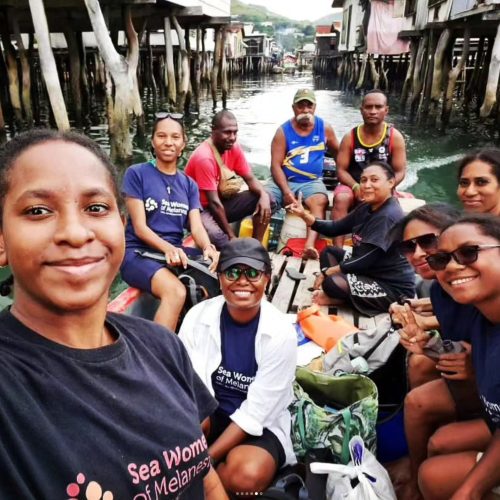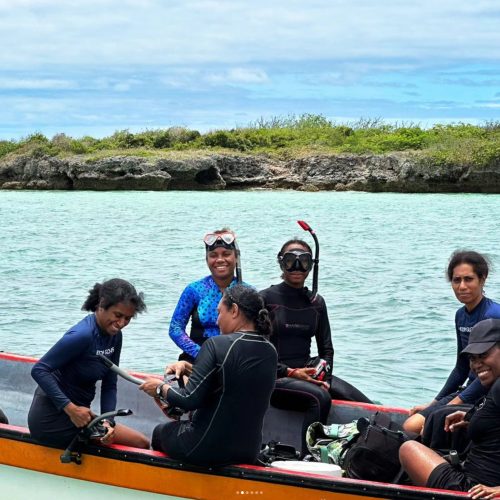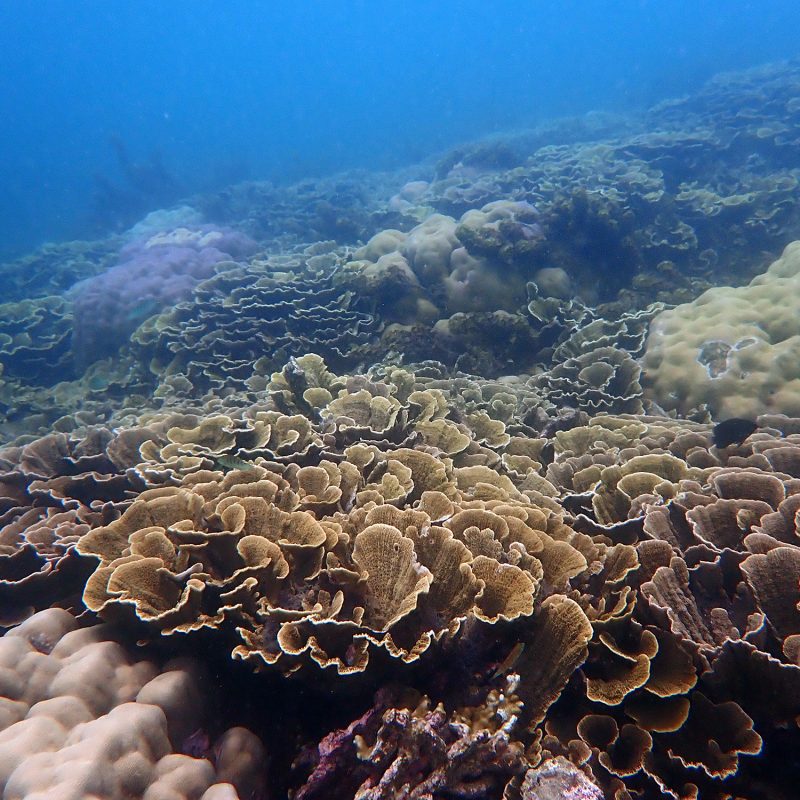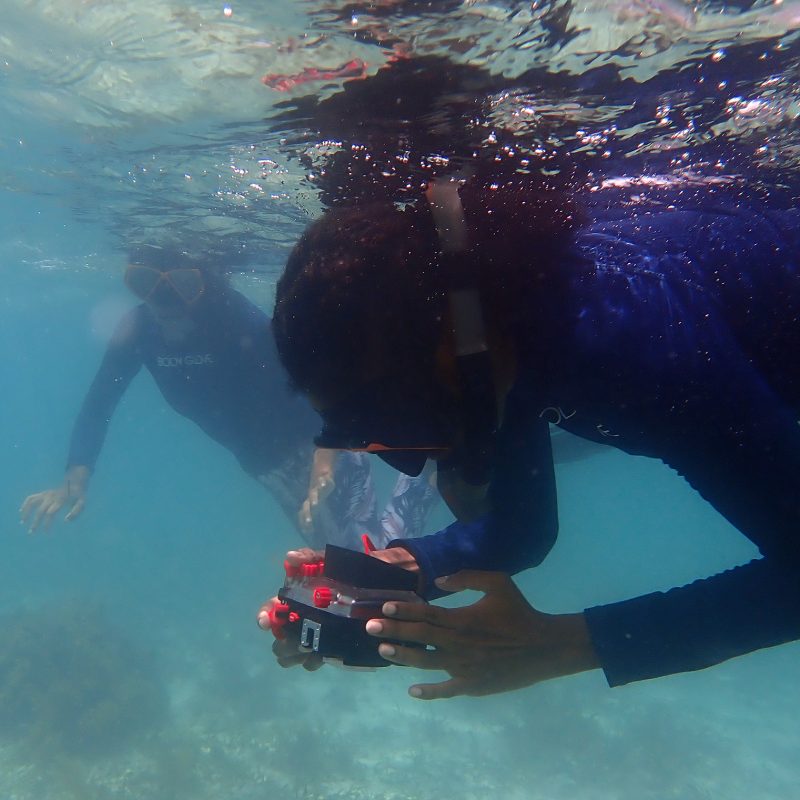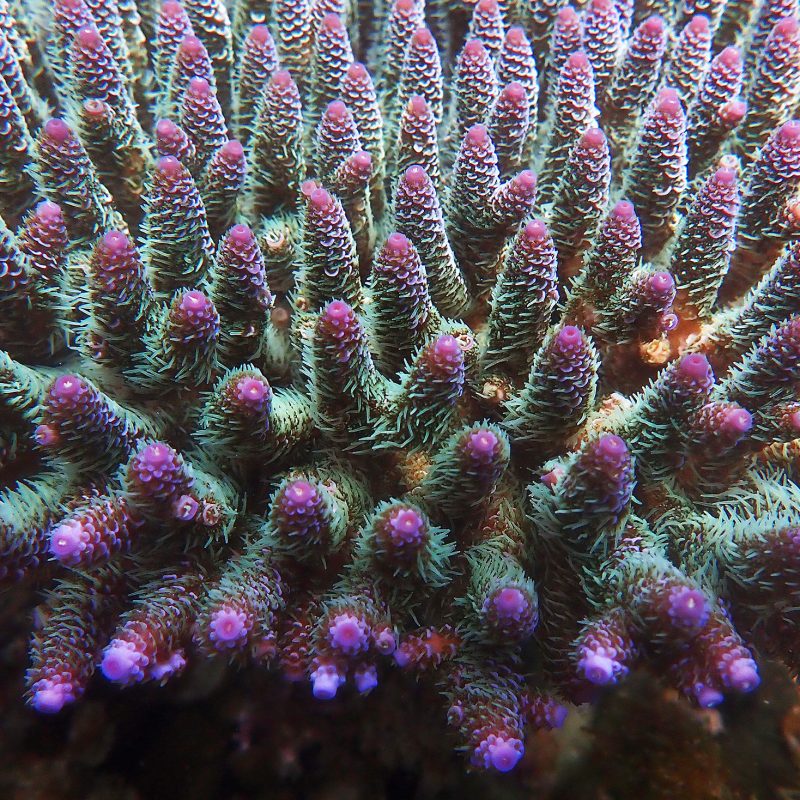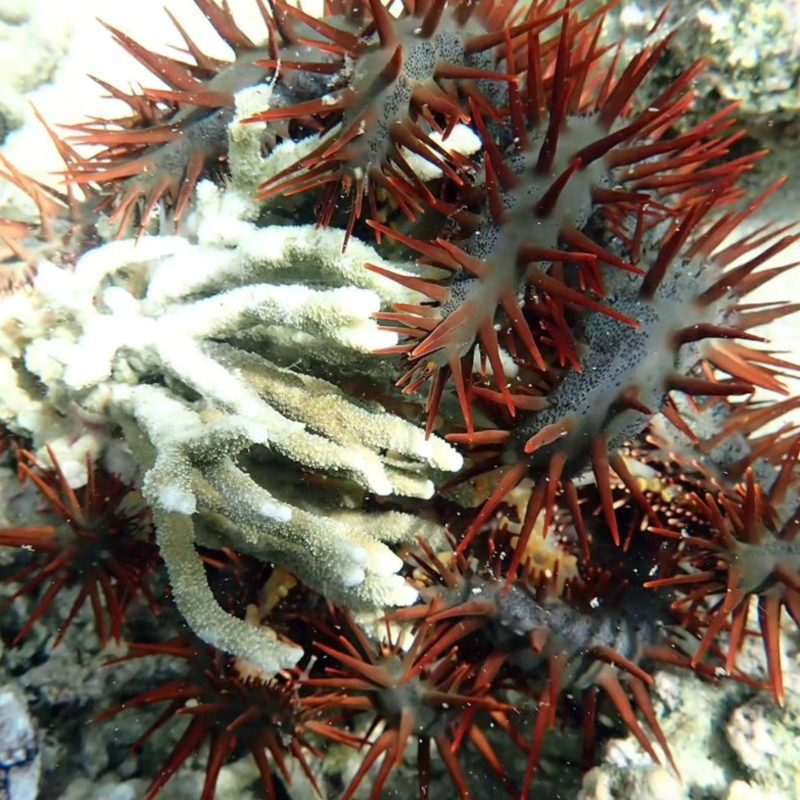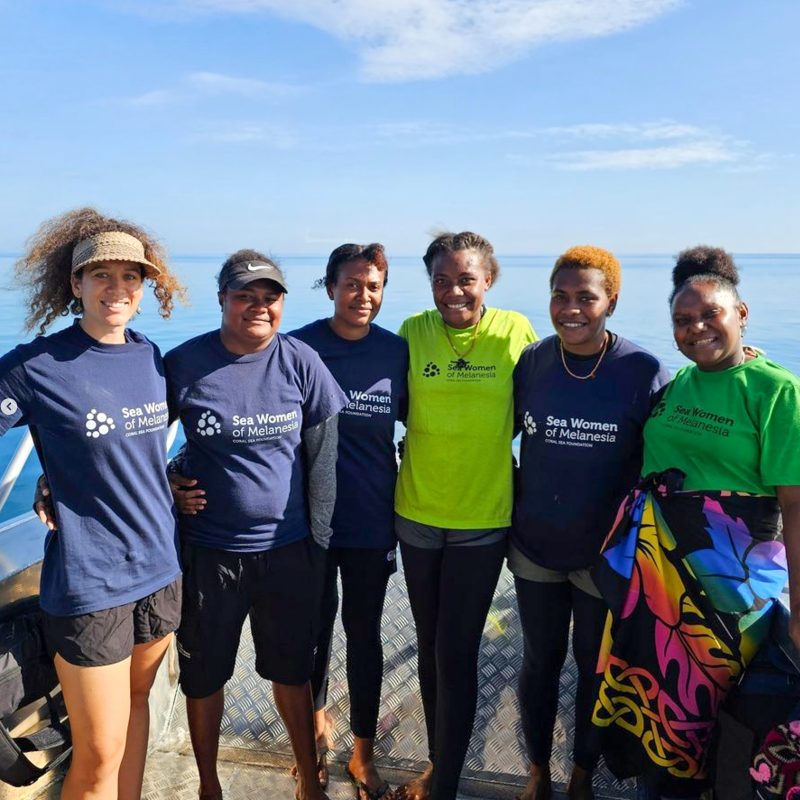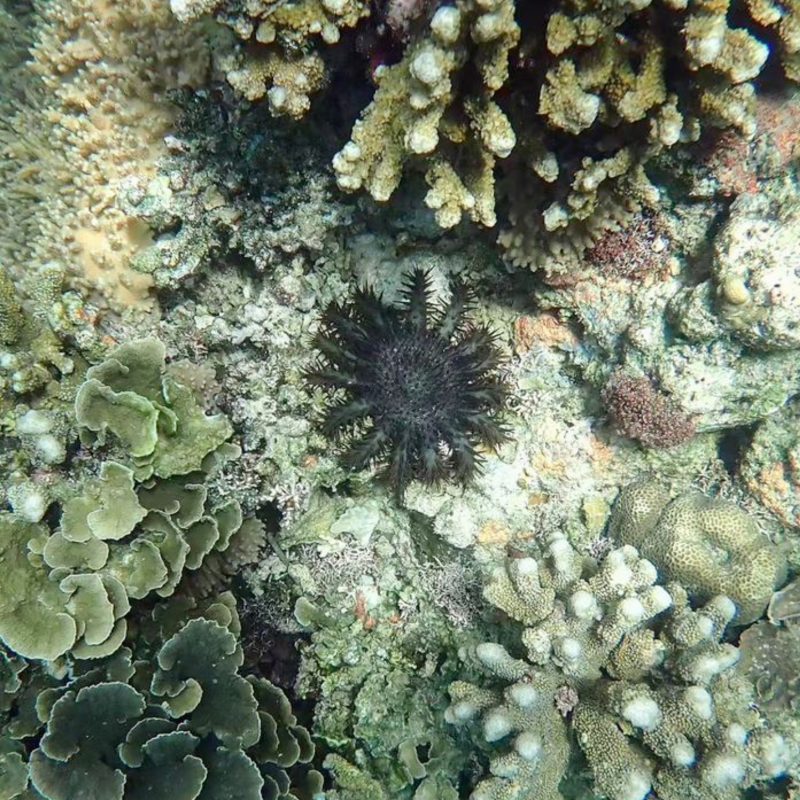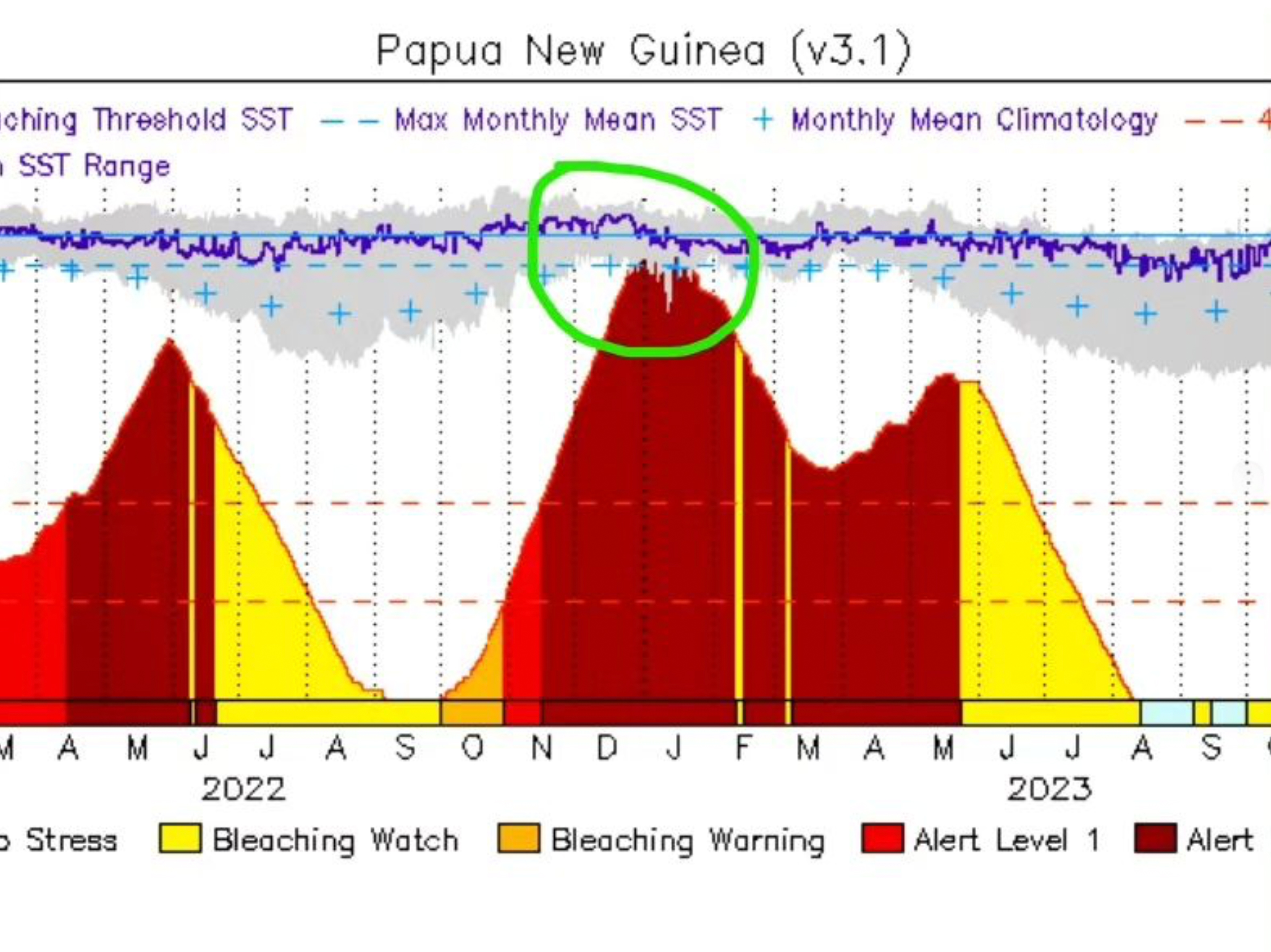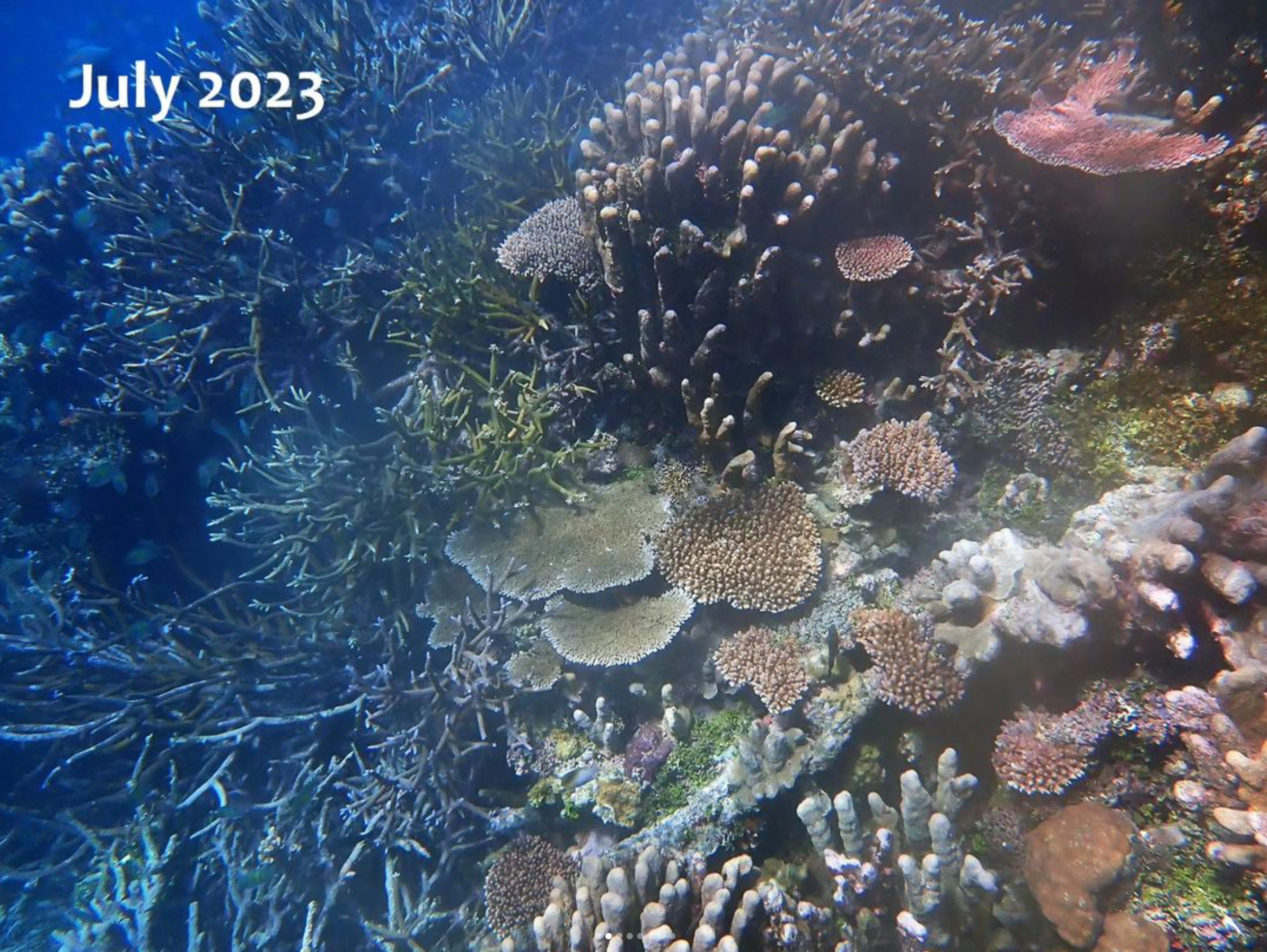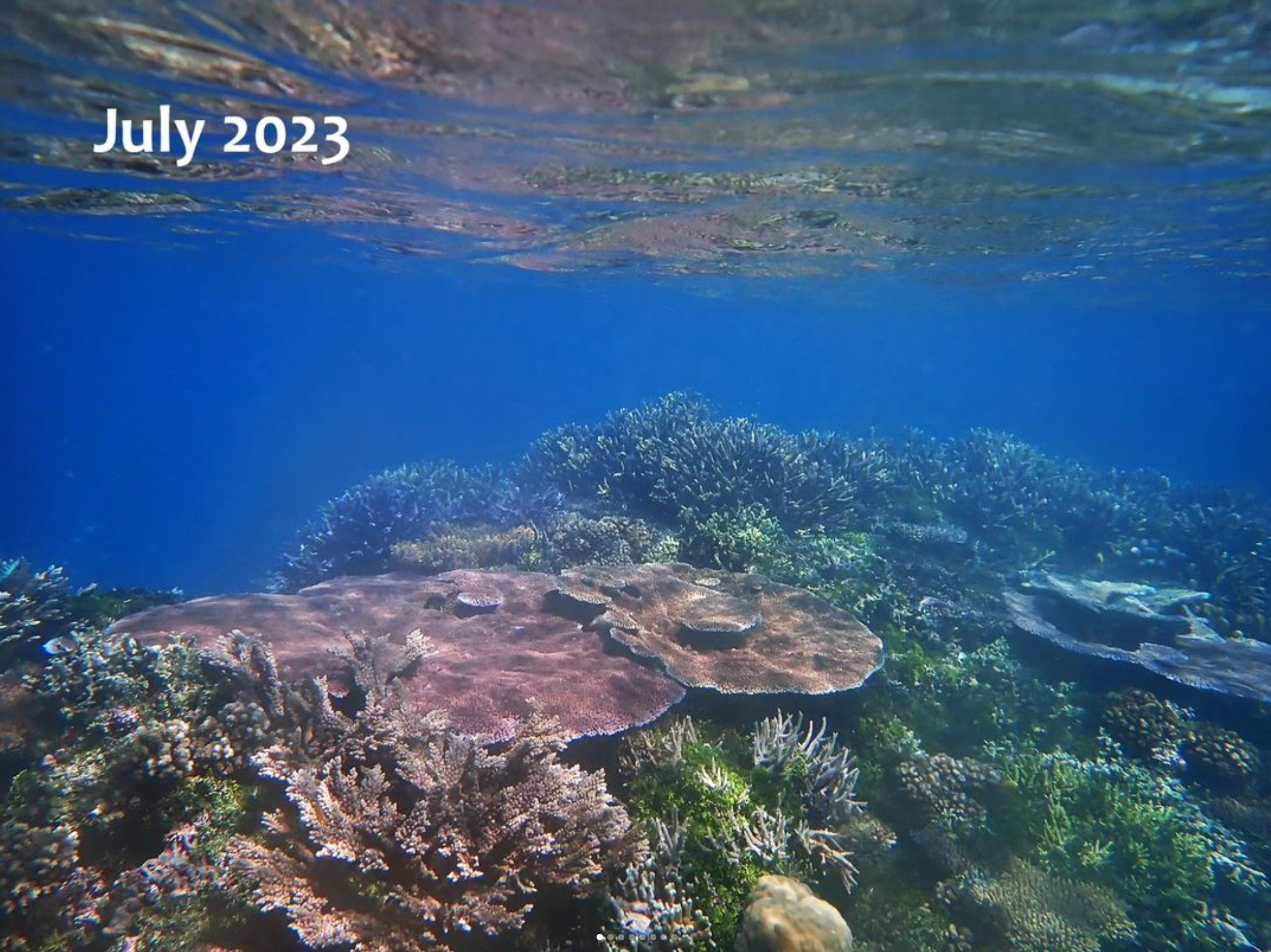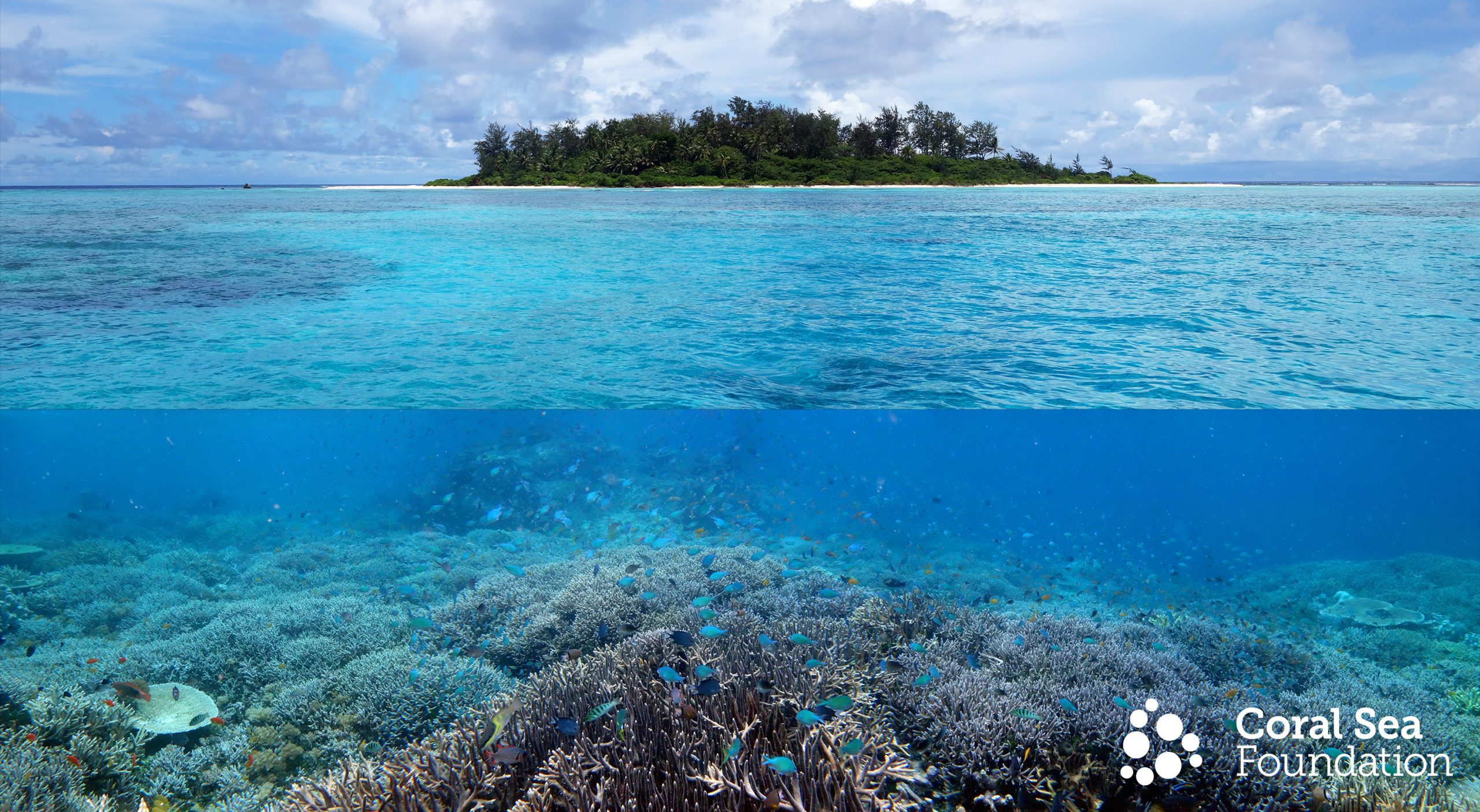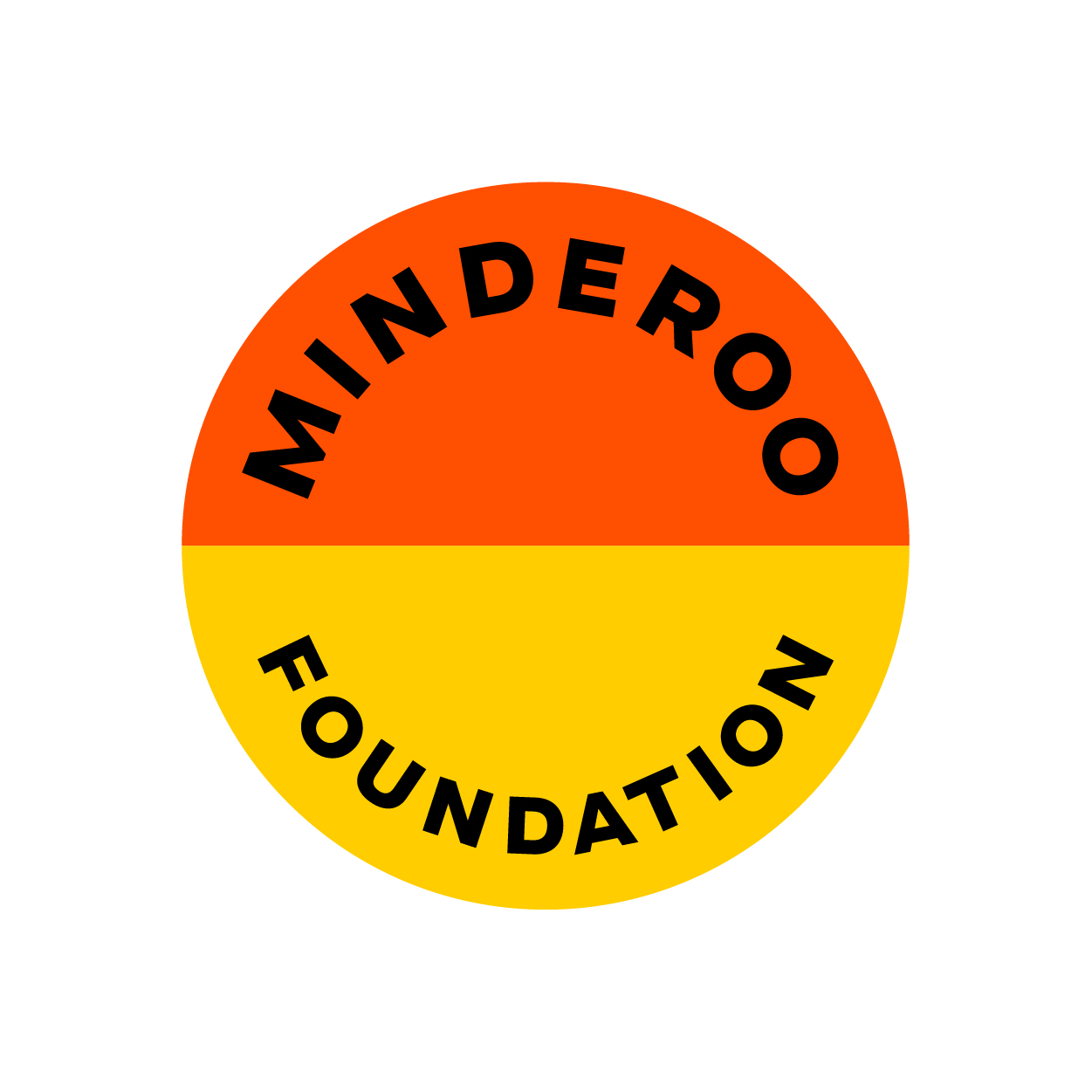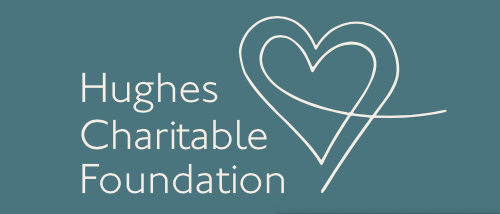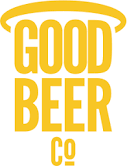Dear members, supporters, and friends of the Coral Sea Foundation, Merry Christmas, and welcome to the latest edition of Coral Sea News! We are excited to share some of the highlights of our marine conservation work around the Great Barrier Reef and Papua New Guinea over the latter half of 2023.
Our banner image features the creation of Indigenous artist Mitchell Blake from Thoolbar Designs, and captures the essence of our work caring for the reef and linking traditional owners from around the Coral Sea arc. We commissioned Mitchell to create a series of awesome new designs for the Foundation, and these are available for purchase at our online store. Proceeds from sales support our Sea Women training programs.
The Second Training Program for 2023 Delivered.
The Coral Sea Foundation successfully conducted the inaugural Sea Women Great Barrier Reef training program in May 2023, and we delivered another skills booster program at Yunbenun (Magnetic Island) in November this year.
The Sea Women Great Barrier Reef training program brings together Indigenous women from North Queensland, Zenadth Kes (Torres Straits Islands), and Papua New Guinea, providing them with the practical marine science skills needed to take a lead role in the sustainable management of the marine resources within their Sea Country.
In the November program, we brought 4 of the most competent graduates back to Yunbenun to strengthen their capability across the core areas of scuba diving, photographic reef surveys, expedition planning, and data management. All the women are actively involved in sea ranger or marine conservation work, and it was very rewarding to see clear improvement in their skills and confidence on the water.
Over the fortnight on the island, the ladies:
As we continue our mission to raise awareness of the value of the Great Barrier Reef and the wider Coral Sea arc, we invite you to join us in making a difference. Your donation will enable us to expand our training programs and empower more Indigenous women to become involved in marine conservation and caring for sea country.
Reef Monitoring update: Great Barrier Reef & Papua New Guinea
Over the last 6 months, we have made very good progress in expanding the number of reef monitoring sites in both PNG and Queensland that have data in our ReefCloud Project spaces. ReefCloud.Ai is an automated system for analysing digital reef survey imagery, developed by the Australian Institute of Marine Science, and it offers tremendous improvements in the speed and efficiency with which reef survey imagery can be processed.

The Coral Sea Foundation and the Sea Women of Melanesia pioneered the use of Olympus Tough TG camera systems to collect geotagged survey imagery in Papua New Guinea, and the addition of post-survey analysis with ReefCloud represents a significant improvement in the tools available to citizen scientists and traditional owners for collecting quantitative information on reef health.
Currently, we have 44 sites and over 2,500 images in our Sea Women of Melanesia PNG ReefCloud Project, and these sites extend from the Bismarck Sea (Kimbe & New Hanover) to the Solomon Sea (Ferguson Island) and the Coral Sea (Port Moresby), covering 7 degrees of latitude and 900km. These images are the very first contributions from PNG to the ReefCloud Project, and they represent an important snapshot of contemporary coral cover across multiple sites within the nation. It has been a fantastic effort by the Sea Women teams to collect this data, often under difficult circumstances of weather and security.
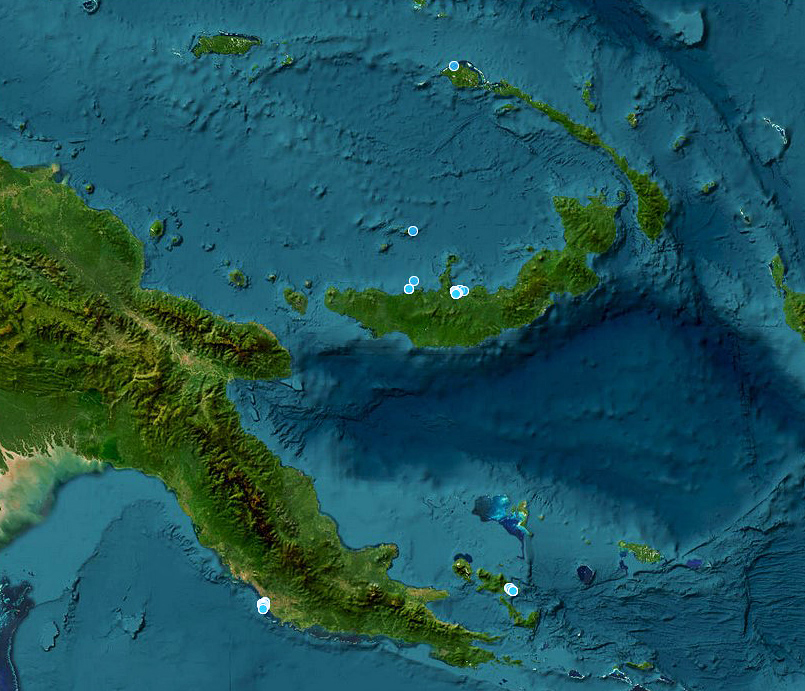
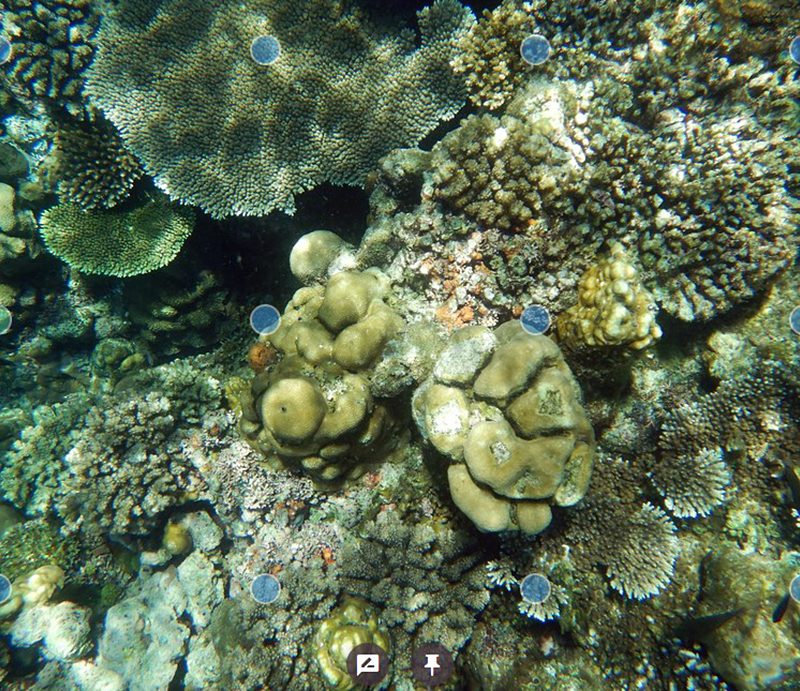
Our ReefCloud project for the Great Barrier Reef includes 7,545 images collected at 50 sites, extending from Lizard Island to the Palm Island group and Magnetic Island. Our ReefCloud volunteer team has grown to more than 80 people across 5 different countries. Their efforts are playing a crucial role in training the AI to enhance the accuracy of survey imagery assessments and we thank them for their contributions. If you’re interested in joining our volunteer team and want to learn how to use ReefCloud, while also supporting our marine conservation work and gaining insights into coral identification, please email [email protected]
Online Educational Resources & Research Opportunities
The Educational Resources section of our website now has a comprehensive package of digital assets, dedicated to supporting marine science and coral reef conservation work around our region. These resources are open-source and free to use; in particular, they offer Indigenous reef owners the tools they need to advance reef survey and monitoring work on sea country.
Training manuals and supporting videos for our reef survey methods are also freely available, along with digital field guides, satellite mapping apps, and marine science presentations. Our ReefCloud Label ID Guide and our tutorial videos also offer straightforward, step-by-step instructions to help you use the ReefCloud.Ai platform.
Contribute to Reef Monitoring
The Coral Sea Foundation Magnetic Island Reef Monitoring Project provides a framework that allows anybody with an underwater camera to contribute scientifically useful information on the status of the reefs around the island.
Time-series images of the same piece of reef are a very powerful tool to convey information about reef dynamics, and from a scientific point of view, they are essential in making accurate assessments of reef conditions. GPS and geotagging digital camera technology now make it very easy to relocate and re-photograph reef sites in a non-intrusive way that does not damage the reef surface.
It is particularly easy to photograph the same site if distinct natural features, such as massive coral rocks, are used to identify the survey area. We have discovered and mapped a network of these natural features at a series of 13 sites, right around the island, wherever reefs are growing. Now we would like you to help us by using your camera to continue the monitoring work!
This will provide valuable reef condition information to the island community, the traditional owners, and management agencies, as well as provide an ongoing framework for citizen scientists to participate directly in the collection of photo-monitoring data around Magnetic Island, one of the most accessible reefs on the Great Barrier Reef.
For more information visit our Magnetic Island Reef Monitoring Project page, which includes links to our survey methods and site locations.
The utility of our Reef Survey methods and the innovative reef monitoring work of the Sea Women of Melanesia teams has been internationally recognised. They received an invitation to collaborate with the Australian Institute of Marine Science, Conservation International, the Samoan Government, and the Secretariat of the Pacific Regional Environment Program on development of the Pacific Coral Reef Monitoring Framework.
This new framework will blend traditional ecological knowledge with the latest photographic monitoring methods and ReefCloud.Ai image analysis. It will provide Pacific Island nations with a robust suite of tools to help them manage their coral reef resources while taking into account cultural knowledge of sea country.
SWoM Directors Naomi Longa and Gou Ava, along with team members Shirley Tassi and Bianca Beri, recently travelled from PNG to Bundaberg to participate in the second Traditional Ecological Knowledge Exchange Workshop hosted by AIMS and the Gidarjil Aboriginal Corporation.
The ladies were able to provide valuable insights into the cultural knowledge of coastal people in Papua New Guinea and their experience with grassroots marine conservation work with local communities. The final workshop in this series will be held in Samoa in February 2024. Links to media articles about the workshop are below. (Image: Luke Barrowcliffe, courtesy of Australian Institute of Marine Science)
The Lizard Island Coral Reef Study Tour
In October, the Coral Sea Foundation team helped deliver the second annual Lizard Island Coral Reef Study Tour at Jiigurru (Lizard Island). This merit-based program provides an opportunity for NSW public high school students with an aptitude and interest in marine science to come to the Lizard Island Research Station for a 7-day coral reef ecology field course and experience the underwater wonder of the Great Barrier Reef firsthand.
We were blessed with great weather, which allowed us to access the windward edge of the island for the first time in over 5 years, and the students were awe-struck by the sensational coral cover and abundant marine life. We also introduced the students to our photographic reef survey methods and the ReefCloud.Ai system. Once again we were impressed by the speed with which this method can be taught to new users. With the help of the students, we were able to collect another comprehensive set of survey images from 12 different sites around the island, and these have now been added to our GBR ReefCloud Project space.
Many thanks to LIRS Directors Dr Anne Hoggett and Dr Lyle Vail, and to Lizard Island Reef Research Foundation Chair Kate Hayward, for their ongoing support of this program.
Lizard Island: Monitoring Sites
Most of our monitoring sites around Lizard Island continue to show strong recovery of their coral assemblages after the intense impacts of tropical cyclones (2014 & 2015) and bleaching events (2016 & 2017). This time series of images from North Reef illustrates just how quickly the Acroporid corals can transform the reef seascape!
Lizard Island: Corals on Clams Research
A notable characteristic of the marine environment at Jiigurru, Lizard Island, is the remarkable abundance of Giant Clams, encompassing six different species scattered around the island. Despite their potential lifespan of up to 100 years, these creatures have faced intense fishing pressure, pushing them to the brink of extinction across much of their former Indo-Pacific habitat. The Great Barrier Reef stands as their final stronghold.
For over two decades, the Coral Sea Foundation team, in collaboration with biologist Dr. Richard Braley, has diligently monitored the Giant Clam populations at Jiigurru, Lizard Island. The clam shells, serving as favorable settlement sites, played a crucial role in the recovery of Acroporid corals following the disruptive cyclones and bleaching events of 2014-15-16. The time series imagery vividly illustrates the remarkable growth rates of these corals.
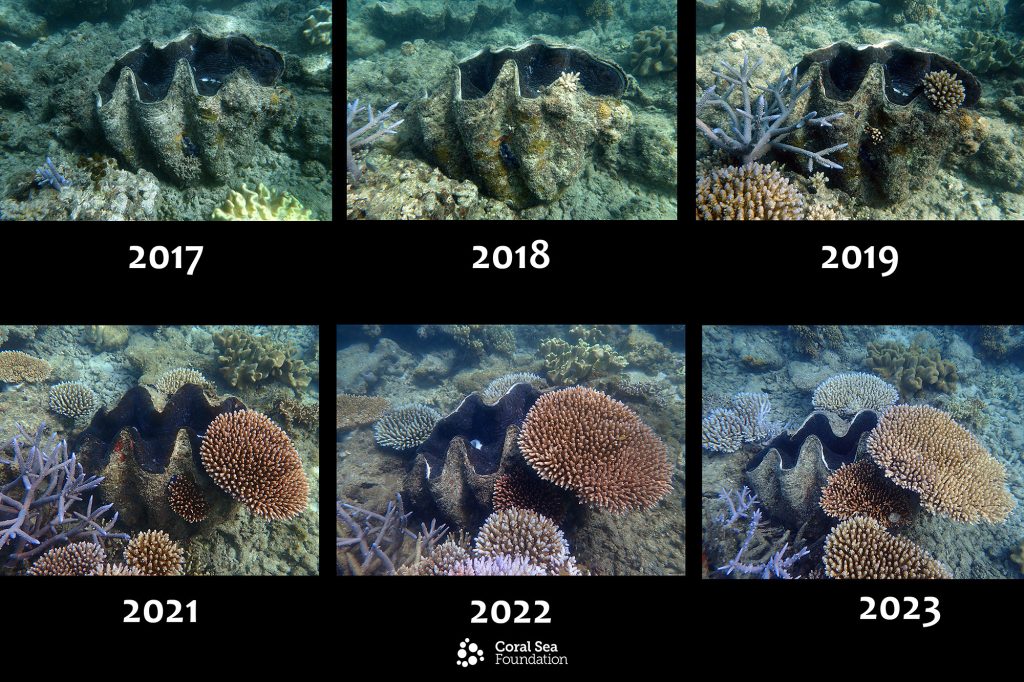
An intriguing aspect of the population dynamics is the tendency for these creatures to form dense clusters, a manifestation of juvenile clams grouping together upon settling as larvae on the reef. Notably, a group of Tridacna gigas clams in Watsons Bay, nicknamed “The Clams of the Round Table,” has thrived in unison for 38 years since a significant recruitment event in the mid-1980s.
Sea Women of Melanesia: Papua New Guinea Operations Update
The Sea Women of Melanesia Inc. is an independent not-for-profit organization with all female Indigenous Directors, fully registered and incorporated in Papua New Guinea. The organisation evolved from the Coral Sea Foundation’s Sea Women of Melanesia (SWoM) training program, which commenced in 2018. It has been absolutely fantastic to see the growth of the organisation and the significant marine conservation results that the ladies have been getting in several different provinces of Papua New Guinea.
In just 5 years, the Sea Women have established 3 regional offices, developed partnerships with several national institutions, secured multi-year corporate and philanthropic funding, participated in international reef monitoring workshops, and conducted reef survey and marine protected area advocacy work in scores of different locations around the country. This would be impressive enough in a first-world country, but bear in mind PNG is one of the most challenging locations in our region in which to do marine conservation work. In their day to day activities the women in the SWoM team contend with frequent power blackouts, inclement monsoon weather, un-seaworthy dinghies, a strongly patriarchal society and a high-security risk that requires armed escorts for most field work. In this light, the national and international recognition that the Sea Women of Melanesia are now receiving is richly deserved. Some of the highlights of the last 6 months are discussed below.
Innovation for Sustainable Development Award
In November, Director Naomi Longa traveled to Kenya to receive the Commonwealth Secretary General’s Innovation for Sustainable Development Award 2023 from the Rt Hon Patricia Scotland KC, on behalf of the Sea Women of Melanesia.
The SWoM were chosen as one of the top 3 winners within the Sustainable Planet category from a pool of thousands of applications. This is a very significant award not only for the organisation, but for the nation of Papua New Guinea, highlighting on the international stage the marine conservation work being done in the Coral Triangle.
Naomi said, “Think Global, Act Local has always been part of the SWoM approach and we are so humbled and grateful that the Commonwealth Secretary General and the selection team have recognized the marine conservation work that we do in the globally significant Coral Triangle waters of Papua New Guinea 🇵🇬“.
The Sea Women of Melanesia team expresses sincere thanks to the Commonwealth Secretary-General, the Rt Hon Patricia Scotland KC, the Kenyan President, His Excellency Hon. William Ruto, and his delegates who attended the award ceremony in Nairobi.
Sea Women Training Programs to Build Capacity
The Sea Women of Melanesia have initiated a series of training programs to bring new women into the team and expand the operational capability of the organisation across Papua New Guinea.
There is a growing demand for marine conservation support from coastal villages in PNG. Communities are increasingly acknowledging the importance of establishing Locally Managed Marine Areas to foster sustainable fisheries and deliver tangible benefits to the community, and the Sea Women of Melanesia play an important role in supporting communities to survey their reefs and prepare their LMMA Management plans.
The most recent capacity-building program was held in Port Moresby in early November, guided by the expertise of Directors Naomi Longa, Gou Ava, and Bianca Beri. Five SWoM members took part in the week-long program, which introduced the ladies to the Olympus TG6 camera systems and gave them an opportunity to learn our Reef Survey methods in a real ocean setting.
A highlight of the training program was an expedition to the Central Province Barrier Reefs where the trainees participated in regular monitoring surveys of reefs in the Gabagaba Locally Managed Marine Area. The trainees practiced their timed-swim transects at Lagilagi Reef, which had abundant seagrass, and then moved on to survey the vibrant coral communities at Laidaroa and Lokoru Reef, collecting a large suite of geotagged images for upload to the SWoM ReefCloud.Ai Project.
Through this training program, the women gained valuable experience in the type of marine conservation work that the SWoM undertakes right across Papua New Guinea, and this will help the organisation to deliver positive outcomes for our partner communities. The SWoM Capacity Building training programs will continue into 2024, with additional emphasis on expedition planning and regional team management.
PNG Crown of Thorns Seastar (COTS) Control Program – Kimbe.
The GBRMPA Crown of Thorns Seastar (COTS) Control Program has been running for a number of years now with great success on the Great Barrier Reef, using teams of divers to inject the coral predators with vinegar, which kills them almost instantly. With hundreds of thousands of COTS eliminated, we now have good scientific data on the effort required to suppress COTS outbreaks and save the ecologically important large breeding corals on the reef.
The economic case is also compelling – it is about 500 times more cost-effective to save mature corals by culling COTS than it is to try and “restore” damaged reefs using farmed coral fragments. We knew from the SWoM team’s monitoring data that COTS were still active in Kimbe Bay, so the Coral Sea Foundation purchased three commercial COTS Control kits from AMPTO in Cairns and had them shipped to Kimbe aboard the vessel Ultimate One from Baia Sportsfishing Lodge.
In October 2023, the Kimbe Sea Women of Melanesia team identified an active and high-density outbreak of Crown of Thorns Seastars (COTS) during their reef surveys at Mowen Reef off Kimbe (Location: 5° 29.184’S 150° 11.964’E). Our ReefCloud analysis also revealed a decrease in coral cover estimates from 60% to 50% along the reef crest, attributed to the activities of coral predators. This presented an ideal opportunity to test the Control Kits and provided the women in the Kimbe SWoM team with another important marine conservation skill to learn.
Kimbe SWoM team leader Tiana Reimann and the ladies successfully executed an eradication mission to Mowen Reef last November — marking the first known application of this technology in PNG! To date, the team has completed three COTS control expeditions in Kimbe Bay for a total of more than 1,100 seastars culled. Importantly, on the follow-up visit to Mowen Reef, they found a 64% decline in the COTS population, with 119 animals culled on the second trip, compared to 335 on the first visit. Considering that each starfish consumes about one coral per day, the efforts of the Sea Women of Melanesia have safeguarded several thousand corals from being consumed in the upcoming weeks.
This initiative is geared towards preserving mature corals, crucial for contributing larvae to the natural replenishment and recovery process on the reefs of the Kimbe Bay biodiversity hotspot. These achievements underscore the importance of regular coral reef monitoring, and the Coral Sea Foundation takes pride in supporting the SWoM teams who play a leading role in this crucial work across multiple locations in Papua New Guinea within the Coral Triangle biodiversity area.
If you wish to support the active coral-saving efforts by the Indigenous women of Kimbe, please consider donating.
Milne Bay: Nua Marine Reserve Bleaching Recovery Surveys
Last summer in January 2023, unusually high water temperatures in the Solomon Sea affected the Milne Bay Province in Papua New Guinea, causing coral bleaching in several areas. This included the Nua Marine Reserve Network on Ferguson Island, our longest-running Locally Managed Marine area in PNG.
Leader of our Ferguson Island Sea Women of Melanesia-PNG team, Lorie Pipiga, collected a suite of reef monitoring images from the Nua Marine Reserve Network at that time which showed widespread bleaching at all four surveyed sites.
In late July this year, Lorie was able to re-survey the corals at Lalai Reef, the biggest and most significant of the Nua Marine reserves. She collected over 220 geotagged survey images and these have now been uploaded to our ReefCloud.Ai system for analysis by our volunteer team. In very good news, there were no remaining signs of bleaching, nor any evidence that there had been significant coral mortality, with the reef looking very healthy.
It just goes to show that not all bleaching events result in the death of corals, and follow-up reef surveys 6-8 months after bleaching events are vital to establish the overall impact to the reef. In these very remote but vitally important areas of the eastern Coral Triangle biodiversity hot-spot, there has never been a greater need for regular monitoring of reef health, and we are very proud to be supporting the hard work of the Sea Women of Melanesia-PNG teams right across the nation as they get this job done.
Charting a Course for Change: Partner with Us!
The Coral Sea Foundation is an Australian registered not-for-profit organisation, and we offer our donors and corporate and philanthropic partners a modern and innovative platform through which to advance practical, science-based marine conservation action throughout our region.
Whether it be supporting our award-winning Sea Women training programs, helping expand our technologically advanced Reef Monitoring work for Indigenous traditional owners, or boosting the geographic scope of our activities through investing in our Vessel Development Project, we welcome all donations and expressions of interest from potential partners.

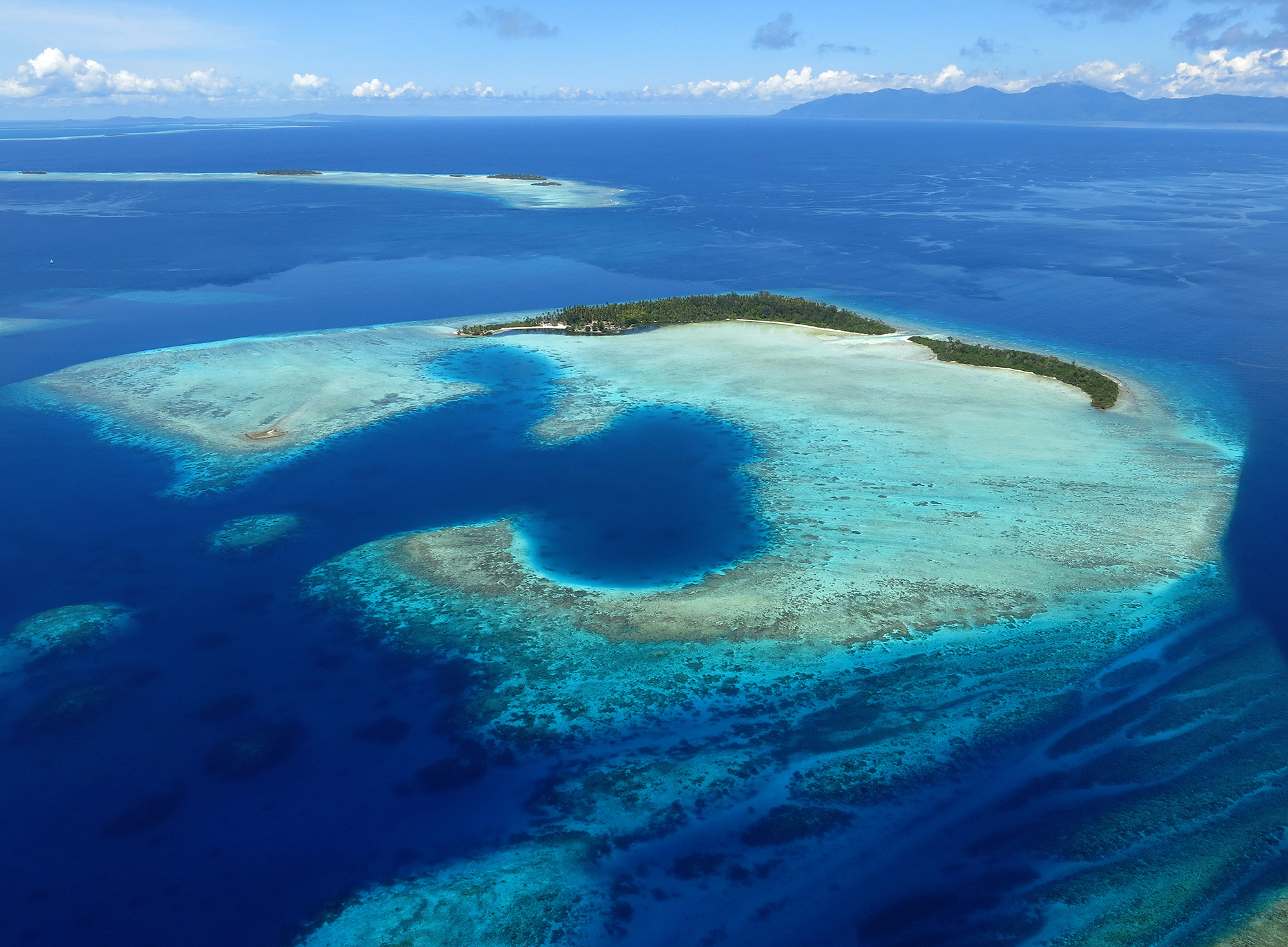

Aligning with the Coral Sea Foundation means more than just supporting a sustainable future for our oceans; it means being a crucial advocate for a transformative change in the way we approach marine conservation. Together we can achieve our goals and steer toward a brighter, more sustainable future for our tropical seas and the people that depend on them.
Thank you!
The Coral Sea Foundation team encourages you to explore the different sections of our website to learn more about our initiatives and actively engage in our conservation efforts. Please don’t hesitate to reach out to us with any questions or inquiries. We look forward to hearing from you!
Merry Christmas and best wishes for a prosperous 2024 from the Coral Sea Foundation team!
SUPPORTED BY
I am text block. Click edit button to change this text. Lorem ipsum dolor sit amet, consectetur adipiscing elit. Ut elit tellus, luctus nec ullamcorper mattis, pulvinar dapibus leo.

